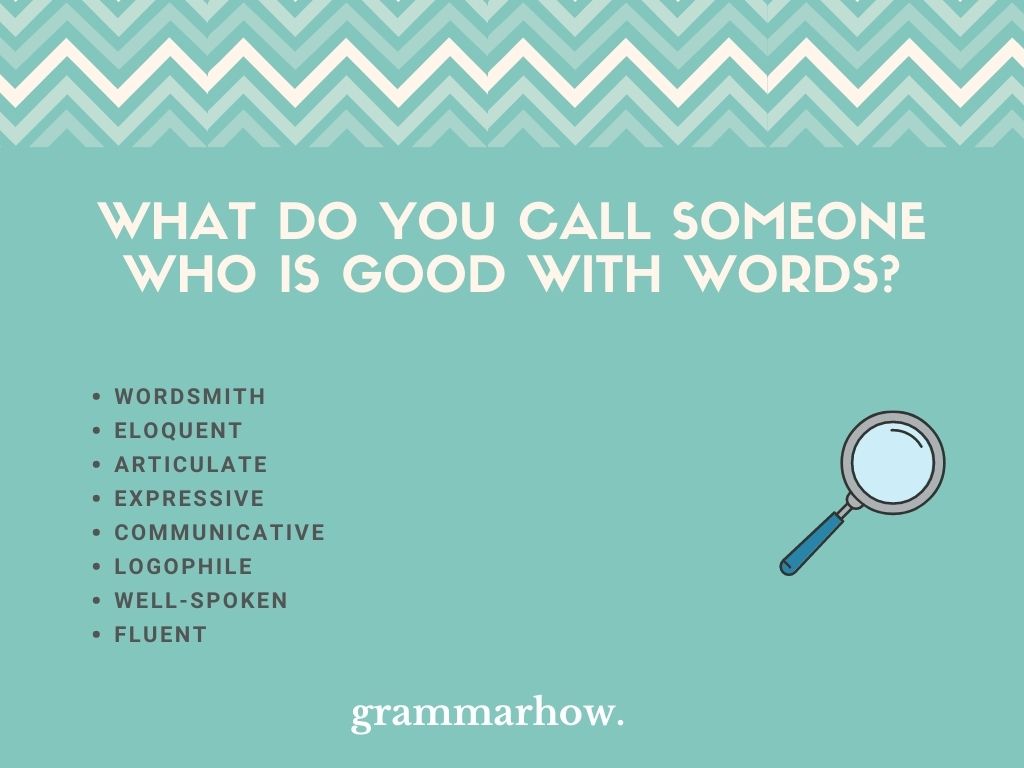When someone has a good vocabulary, you might be interested to know what words you could use to describe them. Interestingly, they’re probably the best people to ask to explain the word you’re looking for. This article will help you understand the best words for such a case too.
What Do You Call Someone Who Is Good With Words?
There are plenty of options to describe someone who is good with words and vocabulary. The ones we want to share with you include:
- Wordsmith
- Eloquent
- Articulate
- Expressive
- Communicative
- Logophile
- Well-spoken
- Fluent
The preferred version is “wordsmith” because it can apply to most situations. We can call some a wordsmith when we’re impressed with their overall usage of the English language and how well they can use words for a variety of reasons.
Wordsmith
Let’s start with the preferred option and see why it’s so suitable for us!
A wordsmith is somebody who has a way with words. They can usually paint very clear images by just describing things, making them perfect speakers and writers in all situations.
The definition of “wordsmith,” according to The Cambridge Dictionary, is “a person who has skill with using words, especially in writing.”
If somebody calls you a wordsmith, you can be sure that it’s meant as a compliment. It means you know things about words and the language you’re speaking in that other people can’t seem to comprehend.
We might be able to use it as follows:
- He’s a wordsmith on paper. He has come up with such impressive ways to describe the most mundane of things.
- She’s a wordsmith, which is why so many people listen to every word she says!
- I’m a bit of a wordsmith myself, and I’ll be happy to help you improve your own vocabulary.
Eloquent
Next, let’s see how we might be able to use “eloquent.”
Someone who is eloquent is able to speak in a clear and concise manner. It usually means they can easily share opinions and ideas, and most of this comes from being good with words. The better someone is with words; the easier people understand their opinions.
The definition of “eloquent,” according to The Cambridge Dictionary, is “using language to express ideas or opinions clearly and well, so that they have a strong effect on others.”
We can see eloquent people in the following ways:
- I like to think of myself as eloquent. After all, no one else can speak quite as I can.
- They were both incredibly eloquent, considering they were still so young.
- You’re quite the eloquent speaker, aren’t you?
Articulate
You might also be interested to learn how “articulate” can work when talking about someone who is good with words.
We can use “articulate” to describe anybody capable of explaining thoughts and feeling with nothing more than words. It’s helpful for their friends and family because they merely need to speak to get people to understand what they’re going through.
The definition of “articulate,” according to The Cambridge Dictionary, is “able to express thoughts and feelings easily and clearly, or showing this quality.”
Some people will struggle to be articulate because certain things require more than words to convey. However, articulate people will always know the right words and combinations of words to convey to get their message across.
An articulate might work in the following ways:
- He’s articulate, which can make it troublesome to talk to him. It’s especially difficult when he’s in his special mood.
- You’re articulate with your words, which is why I think so many people trust the things you say.
- You articulate when you speak, which is why it’s so easy to understand your message.
Expressive
While “expressive” isn’t directly related to being good with words, we can still use it in the correct context.
An expressive person can use their voice to express their feelings. That means they know exactly what to say to trigger a response of empathy in someone, and they know how to explain their feelings.
The definition of “expressive,” according to The Cambridge Dictionary, is “showing your feelings in your voice, behavior, or appearance.”
Expressive people are easy to talk to. If they feel down or low, then they will usually convey this to you to let you know why they might not be feeling like themselves.
It’s easy to see expressive people in the following:
- I’ve never known someone as expressive with their vocabulary as you.
- You can paint such a vivid picture because of your expressive language skills.
- I am expressive when I speak, and I make sure to use all the meaningful words I have at my disposal.
Communicative
Again, “communicative” isn’t quite in line with the meaning of being good with words. However, when used in the right context, it works well to describe someone with this quality.
A communicative person is able to speak and use words unlike anyone else. It comes from “communicate,” which means that people will converse with each other to get their points across.
The definition of “communicative,” according to The Cambridge Dictionary, is “willing to talk to people and give them information.”
Communicative can work as follows:
- He wasn’t feeling particularly communicative, which was strange because he’s usually full of words.
- My teacher is really communicative in lessons because he has a way of saying the right things at the right time.
- He isn’t as communicative with these things as he seems to think he is.
Logophile
A “logophile” isn’t a common word to come across. However, it’s still a great word to use, especially in any situation where you want to show that someone is good with words.
Logophiles love words. It takes the Greek “-phile” suffix, meaning “lover of,” and adds it to the end of “logo,” meaning “words” in Greek. A lover of words is often easy to talk to, and they’ll be happy to share their vocabulary knowledge with anyone who asks.
The definition of “logophile,” according to The Cambridge Dictionary, is “a person who loves words and language.”
A logophile can be described with any other word on this list. They can easily be expressive or articulate because of how much they love words and how much they know about words and their meanings.
Here’s how you might benefit from using it:
- I like to think of myself as a logophile. After all, I know four languages and love all the words I learn!
- He’s a logophile, which is why he thrives when he’s doing any kind of language learning.
- You’re a logophile because you care about the words on the page, where most people will overlook them!
Well-spoken
Now, let’s look at “well-spoken.” Generally, being well-spoken is more to do with how you speak and pronounce things rather than how you use words, but it still works in certain contexts.
A well-spoken person is often well-educated and has a strong understanding of words. They know how to use words correctly to describe and explain their thoughts and feelings efficiently.
The definition of “well-spoken,” according to The Cambridge Dictionary, is “having a pleasant and polite way of speaking that is considered socially acceptable.”
If one is well-spoken, you could write about them as follows:
- She’s well-spoken, considering she comes from one of the most run-down parts of the city.
- I’m well-spoken for my age, and I’m happy to share my vocabularic choices with you.
- You’re not well-spoken enough to be taken seriously here.
Fluent
Finally, we’ll look at “fluent” as an option. It’s not the best option here as it applies to so many different areas, but it’s still a great choice when you’re simply talking about how well someone can speak.
Fluent people are great with languages. They can use words and speak easily without even thinking about it. Most native speakers are fluent in their own language, and some have fluency in others as well. It usually translates to them being good with words for this reason.
The definition of “fluent,” according to The Cambridge Dictionary, is “able to speak a language easily and well, or (of a language) spoken easily and without many pauses.”
Here’s how “fluent” could work:
- I am absolutely fluent with good words. You can ask me the meaning of anything, and I’ll tell you!
- I’m fluent where it counts, which is more than I can say for you.
- She’s fluent in about ten languages, which is why her vocabulary skills are so on-point.
What Do You Call Someone Who Has A Bad Vocabulary?
Just so you have some idea of what kind of antonyms you might be able to use, we thought we’d include this section. While someone can be good with words, it can be just as easy to find someone who is bad with them.
These antonyms are your best bet to show the opposite of someone with good vocabulary:
- Bumbling
- Inept
- Muddled
- Confused
- Stuttering
There aren’t any words that directly show bad vocabulary. However, we can use all of the above in the context of someone being poor with words or writing.
You may also like: 10 Best Words for a Person Exceptional at Writing
Martin holds a Master’s degree in Finance and International Business. He has six years of experience in professional communication with clients, executives, and colleagues. Furthermore, he has teaching experience from Aarhus University. Martin has been featured as an expert in communication and teaching on Forbes and Shopify. Read more about Martin here.
Subjects>Jobs & Education>Education
Wiki User
∙ 11y ago
Best Answer
Copy
For speech, the word could be articulate, eloquent, or glib.
Wiki User
∙ 11y ago
This answer is:
Study guides
Add your answer:
Earn +
20
pts
Q: What word means you are good with words?
Write your answer…
Submit
Still have questions?
Related questions
People also asked
By
Last updated:
December 6, 2022
Are you tired of always saying “good”?
Looking forward to using more vivid and creative ways to describe people, places and experiences that you enjoy?
After reading the descriptions and examples we have below, you’ll be able to move beyond just describing everything as “good.”
Contents
- Cool
- Excellent
- Wonderful
- Perfect
- Fantastic
- Exceptional
- Terrific
- Outstanding
- Pleasant
- Awesome
Download:
This blog post is available as a convenient and portable PDF that you
can take anywhere.
Click here to get a copy. (Download)
Cool
In addition to being used to describe temperature, “cool” also means very good or fashionable. For example, you might describe stylish clothes as “cool” or a performance by a musician that you really enjoy.
It can also be used to express acceptance when someone makes a suggestion. For example, if someone suggests meeting to go to a movie, you could say “Cool! I’ll see you at 6 p.m.” Like “awesome,” “cool” is a popular expression for younger people, and you shouldn’t use it in more formal conversations.
Excellent
“Excellent” is used to describe something very good or of high quality. Almost anything you can describe as “good,” you can also describe as excellent. It can be used when speaking to friends, family, or coworkers when you want to emphasize that something is not just ok or good, but very good.
If someone asks “how are you,” you can respond “excellent.” Or, similar to this restaurant review, you could say “Have you been to the new restaurant downtown? The food there is excellent.”
Wonderful
“Wonderful” means great or very good. People can be wonderful, experiences can be wonderful and things can be wonderful. You can use this word in both formal and casual settings.
For example, you could say “The paintings at the art exhibition last night were wonderful,” or “I think you’ll like her. She’s a wonderful person.”
Perfect
Perfect describes something that is flawless or exactly matching the need in a particular situation.
If you have a very good day and everything happens exactly as you want it to, you could describe it as a “perfect day.” A hotel could be “perfect for families” or an actor in a movie could be “perfect for the role.” If someone suggests an idea that you like, you can say “That’s perfect” or “That sounds perfect.”
Fantastic
The word “fantastic” is used to describe something very good or exciting. It can be used in both formal and informal situations. It’s a very enthusiastic, positive word, so you should say it with some emphasis or exclamation.
For example, if someone asks you about your trip to Thailand, you could say “It was fantastic!”
Exceptional
“Exceptional” means that someone or something is above average. This adjective has a slightly more formal tone, and it’s a good word to use when you want to sound a little more sophisticated.
For example, you could say “I think Italy is one of the most beautiful countries in the world. The scenery is exceptional.”
Terrific
“Terrific” means very good or great. You can use it the same way you use “good.” It’s another very enthusiastic adjective, so only use it if you’re describing something you really like a lot.
You could describe someone’s idea or performance as “terrific,” such as “I’m very happy with the results. She did a terrific job on this project.”
Keep in mind that “terrific” can also be used to describe something very bad depending on the noun it’s paired with. For example, you could also talk about a “terrific storm” or a “terrific explosion.”
Outstanding
“Outstanding” describes something that “stands out” or is noticeably better than the alternatives. An “outstanding” book is better than all the other books you’ve read recently, or an “outstanding” hotel is one of the nicest hotels you’ve ever stayed in. This adjective is appropriate to use in casual or formal conversations.
Note that “outstanding” can also mean “unpaid” depending on the situation. So if you have an “outstanding” bill, it means that you have a bill that needs to be paid, not a “very good” bill.
How do you know which meaning is being used? Context is super important for this. That’s why when you’re learning new words, you should try to learn them in sentences. You can also use immersion programs to see words in different scenarios. On FluentU, for example, you can search for specific words in the program’s library of authentic videos to see how they’re used by native English speakers.
Pleasant
“Pleasant” describes something that is enjoyable or likable. It can be used to describe people, places, or experiences. “Pleasant” is a little less strong than words like “outstanding,” “terrific” or “fantastic” and it can be a good word to use if something was nice, yet not the absolute best thing imaginable.
For example, you could say “We had a nice time at dinner. It was a very pleasant evening.”
Awesome
Technically, “awesome” describes something that inspires awe or wonder. Typically, however, “awesome” is used to describe people, experiences or places that are very good or impressive.
For example, you could say “I love your new watch. It looks awesome.” It’s an adjective that is particularly popular with younger people, and it’s not an expression that you would want to use in a formal or business situation.
Say goodbye to “good!” Now you have some awesome, terrific, wonderful synonyms to improve your English vocabulary way beyond the basics.
Download:
This blog post is available as a convenient and portable PDF that you
can take anywhere.
Click here to get a copy. (Download)
Let’s get one thing clear right up front: Just randomly using big words in hopes you’ll sound smarter isn’t going to work. As one Princeton study found, it can have the opposite effect. But don’t let that discourage from actually broadening your vocabulary. Learning a new word here and there—and knowing how to use it effectively—doesn’t just make you appear more intelligent: It will actually make you more intelligent, for real. Recent studies have found a correlation between increasing your vocabulary as an adult and strengthening your brain.
Now, that doesn’t mean memorizing a dozen or so words with six or more syllables will make you the smartest person in your social circle. No, strengthening your vocabulary is more about having a sincere curiosity about language, and wanting to find new, more creative ways to describe the world around you. To help you on your quest for greater intelligence, here are 30 words that won’t just make you sound smarter, but just might make you smarter. And to see where the most intelligent people live, This Is the Smartest State in the U.S.
Read the original article on Best Life.
IF YOU DON’T KNOW THE DEFINITION ALREADY…: It doesn’t sound like a put-down, but it kind of is. A «cacophony» is any loud, unpleasant mixture of sounds. It could be musical instruments, howling dogs, car horns, or even people.
EXAMPLE: «A bachelor party is happening next door. Hence the cacophony.»
Looking for more ways to boost your intelligence? Just This Many Minutes of Exercise Will Boost Your Brain, Study Says.
IF YOU DON’T KNOW THE DEFINITION ALREADY…: It’s the feeling you get when you’re simultaneously bored and annoyed. You were expecting more, but you got… this? You’re not depressed exactly, but you’d definitely rather be anywhere but here. (If you’re in one of the 50 cities with the worst singles scenes in America, you probably know the feeling.)
EXAMPLE: «How was my date last night? Well, I’ll just say this. At the end, I had a gnawing sense of ennui.»
IF YOU DON’T KNOW THE DEFINITION ALREADY…: You’ve got a serious case of the feels, but you’re not sure how to talk about it without saying «the feels»? Try this tasty word, which means you’re so overcome with emotion that you’re practically trembling.
EXAMPLE: «Am I excited for the new Star Wars sequel? I’m aquiver with excitement!»
What better way to exercise the mind than learning more about it with these 23 Facts About Your Brain That Will Blow Your Mind.
IF YOU DON’T KNOW THE DEFINITION ALREADY…: You can’t put your finger on it, but something about the way that guy is talking sounds completely insincere. He thinks he has all the solutions, but he’s just blowing smoke.
EXAMPLE: «I know you think you’re being helpful, but you’re being way too glib.»
IF YOU DON’T KNOW THE DEFINITION ALREADY…: Can you imagine how much more fun Twitter fights would be if people responded to insults that hurt their feelings with, «Dear sir, I take umbrage to that comment?» Yes, it means «offense» or «annoyance.»
EXAMPLE: «I know you’re just an Internet troll with no sense of right or wrong, but you didn’t have to cause me so much umbrage.»
And for the terms that will have a negative affect on how you’re perceived by others, check out 5 Words That Will Make You Sound Less Confident, According to Experts.
IF YOU DON’T KNOW THE DEFINITION ALREADY…: It’s when the subject in a conversation gets changed without warning, usually abruptly. It’s a nice way of saying, «Have you even been listening to me?» Its Latin translation, literally: «it does not follow.»
EXAMPLE: «Wait, why did you just bring up astronauts? I thought we were talking about mud races. That was a weird non-sequitur.»
IF YOU DON’T KNOW THE DEFINITION ALREADY…: It just sounds like something a Looney Tunes character would say—but it’s actually a legitimate word, meaning «to leave hurriedly.» Originally derived from the Spanish word vamos, which means «let’s go,» modern usage takes it up a notch: When it’s time to vamoose, danger is probably imminent.
EXAMPLE: «I don’t know how a mountain lion got in the room either, but we’ll talk about it later. Vamoose, man, vamoose!»
And for more brain-boosting content delivered straight to your inbox, sign up for our daily newsletter.
IF YOU DON’T KNOW THE DEFINITION ALREADY…: You could say «That stuff is everywhere,» and you’d probably be understood. But then you’re missing all the fun of language. A word like «ubiquitous» communicates the same idea, but it’s the deep-dish pizza of vocabulary. You have to eat it with a fork. (Officially, it means: «found everywhere.»)
EXAMPLE: «Oh yeah, I’ve seen plenty of guys with hipster beards. They’re ubiquitous.»
IF YOU DON’T KNOW THE DEFINITION ALREADY…: Evil is just evil, but when it goes the extra mile into Bond villain territory, that’s when it becomes nefarious.
EXAMPLE: «The way he runs his business, it’s just so… nefarious.»
IF YOU DON’T KNOW THE DEFINITION ALREADY…: Sure, you could ask your wife or girlfriend why she’s being so moody and unpredictable. Or you take a safer tactic, and use a word that isn’t quite so negatively loaded.
EXAMPLE: «You seem a little capricious tonight, dear, is everything okay?»
IF YOU DON’T KNOW THE DEFINITION ALREADY…: No, we’re not kidding. It’s an actual word, referring to any activity that pretends to be useful but is really just a big waste of your valuable time.
EXAMPLE: «Of all the company meetings we’ve had this year, this was the biggest boondoggle!»
IF YOU DON’T KNOW THE DEFINITION ALREADY…: Calling somebody a «suck-up» or a «brown-noser» feels so juvenile, like an insult you’d hurl at somebody in high school. You can do better. And unless they know what it means, «sycophant» can even sound like a compliment.
EXAMPLE: «No, you totally deserve that raise. You’re the biggest sycophant in the office.»
IF YOU DON’T KNOW THE DEFINITION ALREADY…: When music hits you right in the feels, it’s hard to explain why you love it so much. Instead of saying «Damn this is good,» try a slightly more expressive word like «mellifluous.» It means a smooth, flowing sound that hits your ears in just the right way.
EXAMPLE: «I can’t stop listening to the new Arcade Fire record. It’s so darn mellifluous.»
IF YOU DON’T KNOW THE DEFINITION ALREADY…: Telling a pal «your leather shoes are boss» makes you sound like a frat dude. If you’re going to compliment somebody on his sturdy, rugged-looking footwear, use a word with a sense of history. If it was good enough for Irish workers during the 18th century, it’s good enough for you.
EXAMPLE: «I like your brogues, bro.»
IF YOU DON’T KNOW THE DEFINITION ALREADY…: Just by using the word «perfunctory,» you’re being the opposite of perfunctory. (See what we did there?) The only ones who make a perfunctory, halfhearted effort are the ones who aren’t really sure if being called «perfunctory» is a snub but can’t be bothered to look it up.
EXAMPLE: «The interviewer asked all the perfunctory questions. He didn’t seem truly interested.»
IF YOU DON’T KNOW THE DEFINITION ALREADY…: Words like «affair» and «one-night stand» sound so judgy. If you’re having a secret meeting with somebody you shouldn’t be alone with, and it’s possible one or more of you weren’t wearing pants, well my good sir, that’s a tryst.
EXAMPLE: «No, we never officially dated. We just had the occasional tryst.»
IF YOU DON’T KNOW THE DEFINITION ALREADY: It’s also the name for sulfuric acid, which is powerful enough to burn through just about anything. That’s how it works with the emotion as well. If you have vitriol for someone, well, they’re far from your favorite person.
EXAMPLE: «Don’t even bring up that guy’s name. The amount of vitriol I have for that person, I can’t even explain.»
IF YOU DON’T KNOW THE DEFINITION ALREADY…: Rarely does such a simple word (or a word and a number) express such a complicated idea. You can thank Joseph Heller for coining the term in his 1962 novel Catch-22. It’s a paradox where there’s no escape: You’re damned if you do and damned if you don’t. If you ever find yourself in a situation where there are no easy answers and either choice seems seems like a dead end, what you have is an old-fashioned catch-22.
EXAMPLE: «You have to have money to make money. It’s a catch-22.»
IF YOU DON’T KNOW THE DEFINITION ALREADY…: If it’s starting to seem like an expanded vocabulary is just an excuse to be more creative with your insults, you might be right. But if you’re so dim and slow-witted that you don’t realize that being called obtuse isn’t adulation, maybe you a little bit deserved it?
EXAMPLE: «Don’t worry, he’s too obtuse to realize we’re talking about him.»
IF YOU DON’T KNOW THE DEFINITION ALREADY…: We don’t mean the Family Guy character, but a swampy marsh, or any difficult or precarious situation. If you’re stuck in a quagmire, you’re in quite the predicament.
EXAMPLE: «Until he pays off the IRS, Bob’s in one heck of a financial quagmire.»
IF YOU DON’T KNOW THE DEFINITION ALREADY…: We live in a scary, uncertain world, and it’s easy to feel bewildered or confused. But you can add a little color to your consternation by using a word that sounds like it belongs in a British comedy.
EXAMPLE: «I was following the GPS, I have no idea how we got this lost. I’m flummoxed!»
IF YOU DON’T KNOW THE DEFINITION ALREADY…: When somebody’s pushing for you to do something you’d rather not be doing, you could accuse them of trying to bully or dupe you—what we once called «peer pressure» in high school—or you could hit them with a word that gives them pause. That alone might make them back off.
EXAMPLE: «Nice try, but you’re not going to cajole me into drinking another beer.»
IF YOU DON’T KNOW THE DEFINITION ALREADY…: We’ve all been caught in the act of being a jerk for no reason. But who wants to say, «Sorry, I was a jerk for no reason?» Here’s a better way to explain.
EXAMPLE: «No, I didn’t really mean it when I said you would die alone and unloved. I was being caustic.»
IF YOU DON’T KNOW THE DEFINITION ALREADY…: You were gonna lobby for a raise at work but your boss is already planned on giving you one? It’s a fait accompli! Your partner’s been pestering you to do the dishes but they’ve already loaded the washer? Another fait accompli! If there’s a cooler, more French, way of saying «Already done,» we haven’t heard it. (It’s not always a good thing, though—when HR puts a frustrating new policy into effect and only tells you after the fact, that’s a fait accompli, too.)
EXAMPLE: «What’s that, dear? You need me to take out the trash? Well, no need. Fait accompli!»
IF YOU DON’T KNOW THE DEFINITION ALREADY…: A truly great word gives people pause, forcing them to wonder if it really means what they think it is. Gregarious sounds like an endorsement—and it is; it means somebody is sociable and fond of other people’s company—but phonetically it’s a little too close to «gangrene.» They could ask, but that would mean admitting they don’t know what the word means.
EXAMPLE: «You know why I like you? You’re one of the most gregarious people I know.»
IF YOU DON’T KNOW THE DEFINITION ALREADY…: A fun word because it changes depending on the context. Used to describe somebody who’s obsessed with the small details and can be very difficult to please, it’s obviously meant as a compliment when you say, «You’re an excellent cook, you must be very fastidious in the kitchen.» Great for the office, but maybe not so much when it’s used in the bedroom.
EXAMPLE: «It’s six hours and you still haven’t had an orgasm? You’re being way too fastidious.»
IF YOU DON’T KNOW THE DEFINITION ALREADY…: Feeling a little tearfully sentimental? Or choked-up with emotion for no apparent reason? Describe what you’re feeling with a word that manages to have some gravitas (despite it normally being used to diss something as overly sentimental). Ernest Hemingway was never weepy, but he definitely had his (drunk) maudlin moments.
EXAMPLE: «Sorry, looking at all these old photos always makes me maudlin.»
IF YOU DON’T KNOW THE DEFINITION ALREADY…: That feeling you get when you read the news every morning, and you’re like, «Is this real? Is that actually happening? This can’t be real life.» That’s you being flabbergasted.
EXAMPLE: «Yes, I saw Game of Thrones last week. I’m still flabbergasted.»
IF YOU DON’T KNOW THE DEFINITION ALREADY…: Whether you’re a recovering alcoholic or have never touched a drop, abstaining completely from alcohol qualifies somebody as a teetotaler. Where on earth does it come from? Nobody’s entirely sure. It might have something to do with drinking tea: It first came into fashion during England’s temperance movement of the early 19th century. (Richard Turner, the guy who most likely came up with the word, liked it so much that he put in on his gravestone.)
EXAMPLE: «Are you sure you want to invite him to your bachelor party? He’s a teetotaler.»
IF YOU DON’T KNOW THE DEFINITION ALREADY…: You should really know what this means by now—and it’s definitely one we should try using more often. People with even the slightest sensitivity to other people’s feelings might as well have super powers.
EXAMPLE: «I know you think he’s the enemy because of his political beliefs, but let’s try to have a little empathy, okay?»
The Intrepid Guide contains affiliate links. At no cost to you, I will earn a commission which helps reduce the ever-increasing costs of keeping this site active. Thank you for your support.
From Afrikaans to Zulu, here are 203 most beautiful untranslatable words in other languages from around the world that should exist in English.
If you’ve ever tried to learn a language, then you’ll know that translating is not always an easy task. There are over 7,000 languages in the world and just as many words and ideas that get ‘lost in translation’ due to differences in grammar and semantics, or even linguistic complications. When a language fails to convey the essence of a word during translation, the word is considered to be ‘untranslatable.’
There are many terms that drip with feeling and emotion that are simply untranslatable into English. By taking a closer look at some of the most beautiful untranslatable words from around the world, they can give us a glimpse into different cultures and belief systems that help us to understand the people who speak these marvellous languages.
English is no stranger to borrowing words from other languages and even inventing new ones like ‘hangry‘, a combination of anger and hunger because you need something to eat asap. Then there is ‘nomophobia‘, an irrational fear or sense of panic felt when you’ve lost your phone or are unable to use it. Even English playwright William Shakespeare invented plenty of words too such as ‘faint-hearted‘ and ‘tongue-tied‘. These new words have entered English dictionaries at a fast pace, keeping up with the diversity of the English-speaking world.
In spite of this, the English language can’t explain everything so succinctly, and yet there are many other languages that have, in just one word. This comprehensive list looks at some of the most beautiful words in different languages that are simply untranslatable into English. Many of which we should definitely borrow.
From Afrikaans to Zulu, here are 203 of the most beautiful untranslatable words from other languages.
Afrikaans
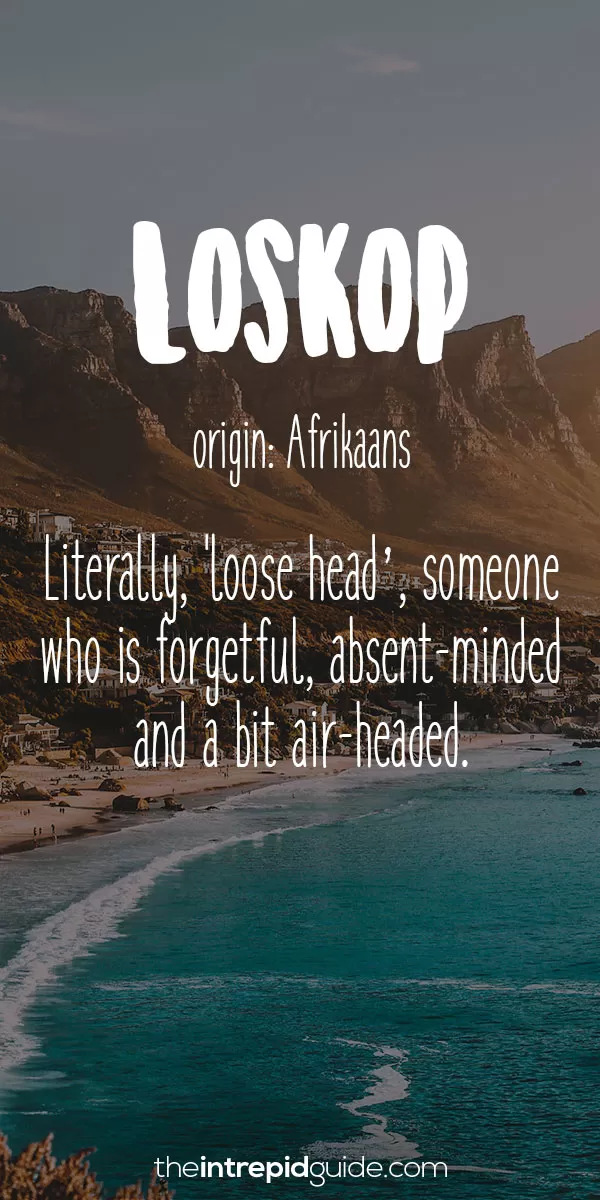
Learn Afrikaans for travel! Get my free Afrikaans travel phrase guide here.
Albanian
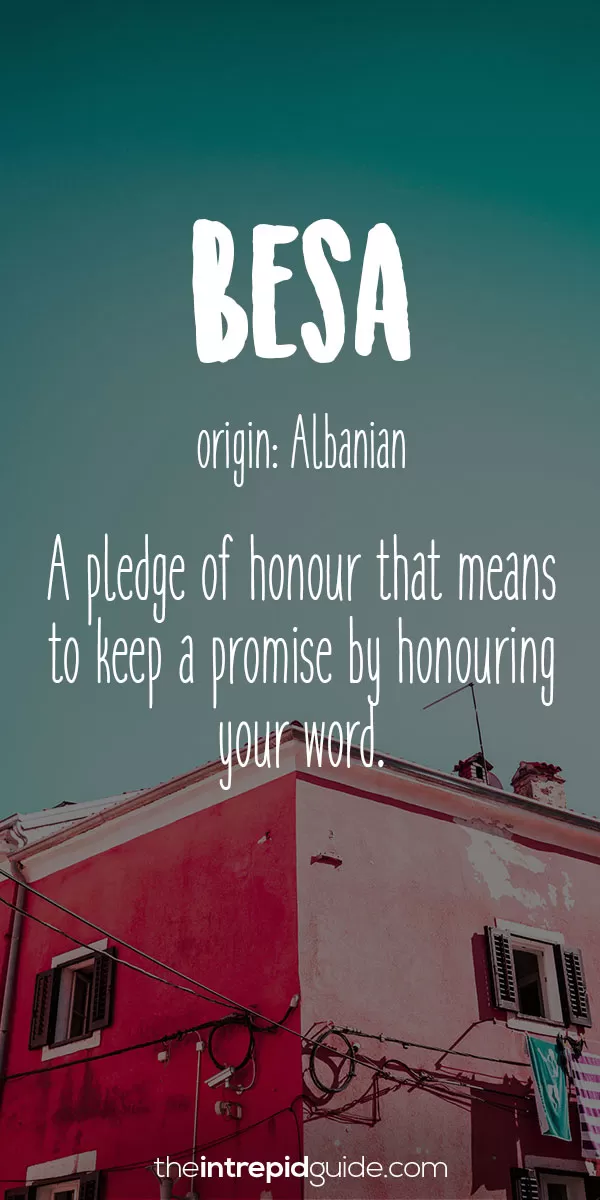
Arabic
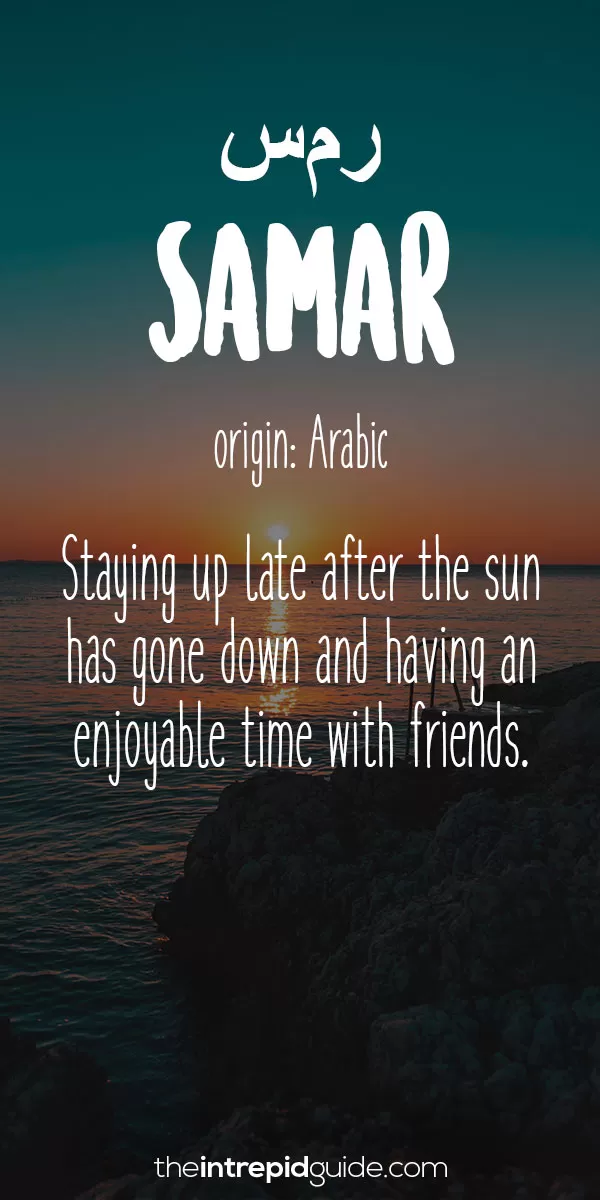
Taarradhin (تراض) – Taarradhin is the act of coming to a happy compromise where everyone wins. It’s a way of reconciling without anyone losing face.
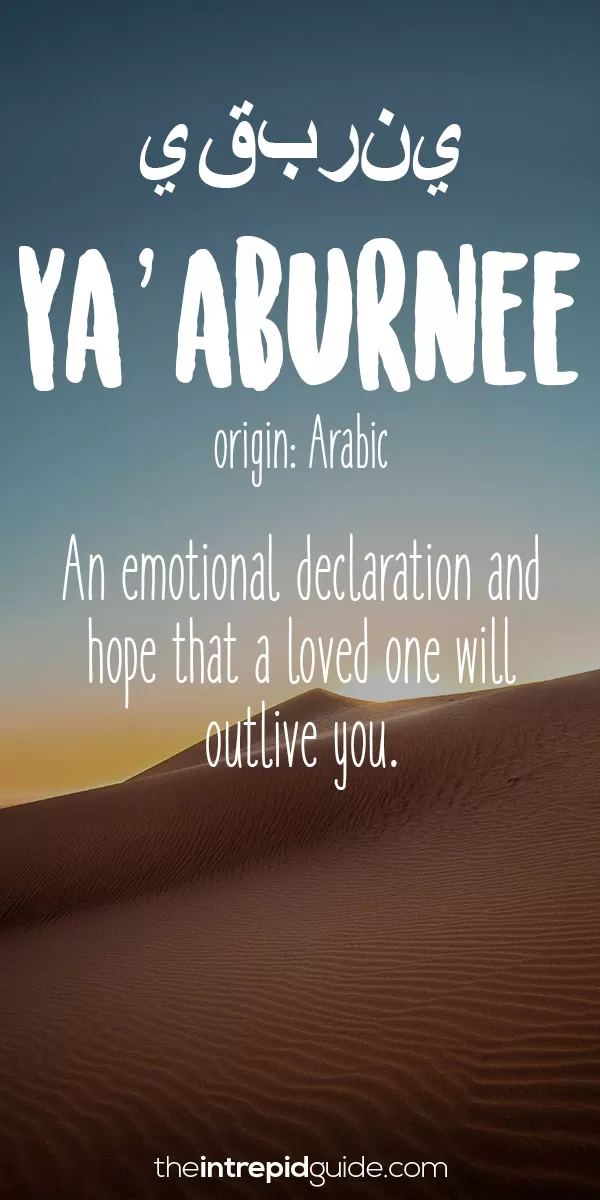
Learn Arabic for travel! Get my free Arabic travel phrase guide here.
Basque
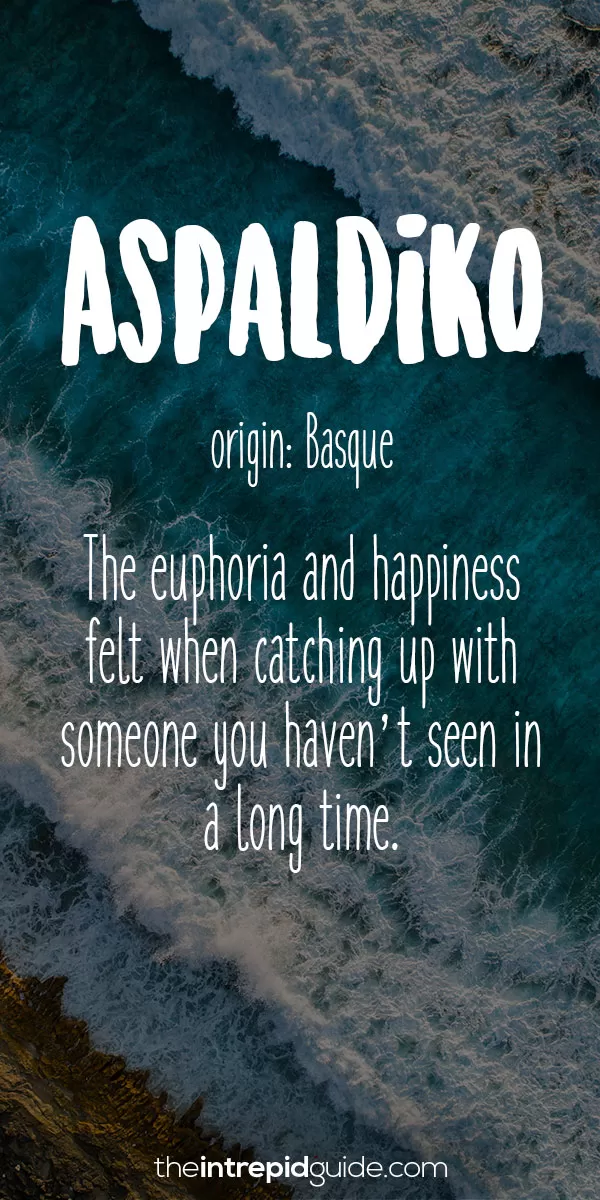
Learn Basque for travel! Get my free Basque travel phrase guide here.
Bengali
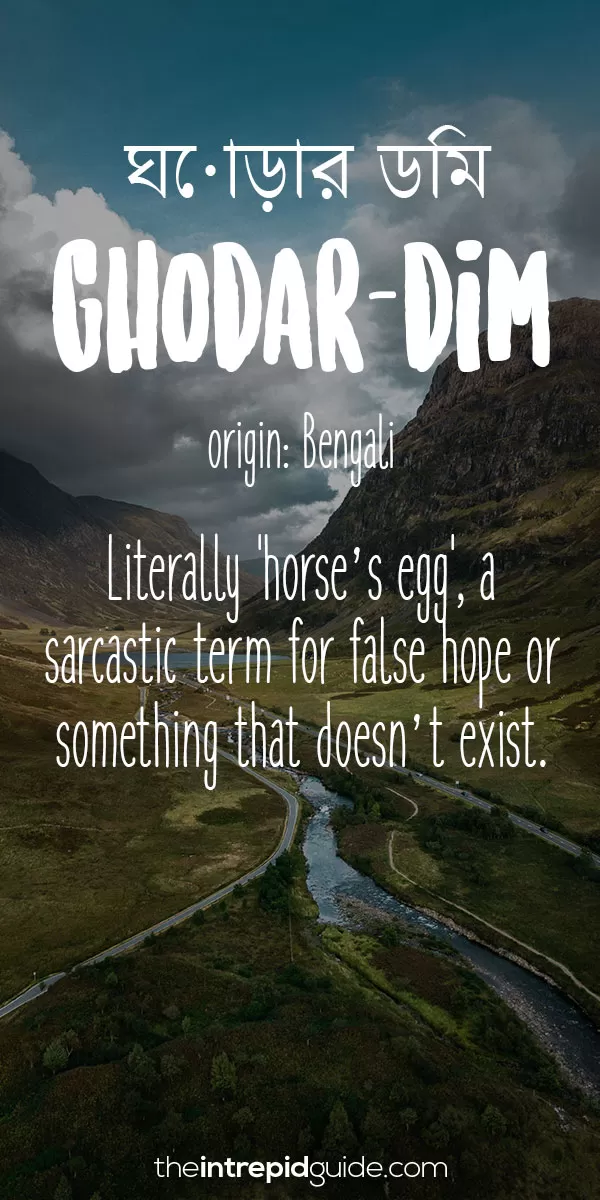
Bulgarian
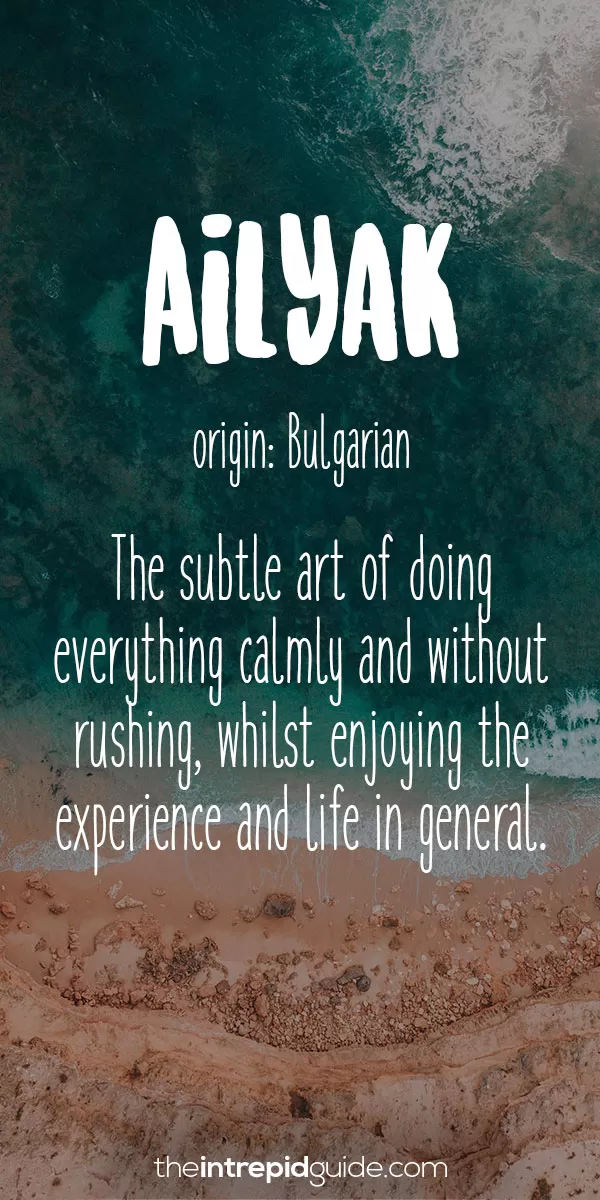
Learn Bulgarian for travel! Get my free Bulgarian travel phrase guide here.
Chinese (Mandarin)
Guanxi (关系) – Pronounced [gwan-shee], guanxi is often translated as ‘connections’, ‘relationships’ or ‘networks’ and refers to having a strong personal relationship with someone which involves moral obligations and exchanging favours. This is one of the essential ways of getting things done in traditional Chinese society. To build up good guanxi, you do things for people such as give them gifts, take them to dinner, or other favours. If you need to call in a favour then you ‘use up’ your guanxi.
Once a favour is made, an unspoken obligation exists. Because of this, people often try to refuse gifts, because, sooner or later, they may have to repay the debt. However, the bond of guanxi rarely ends, because once the relationship exists, it sets up an endless loop that can last a lifetime.

Czech
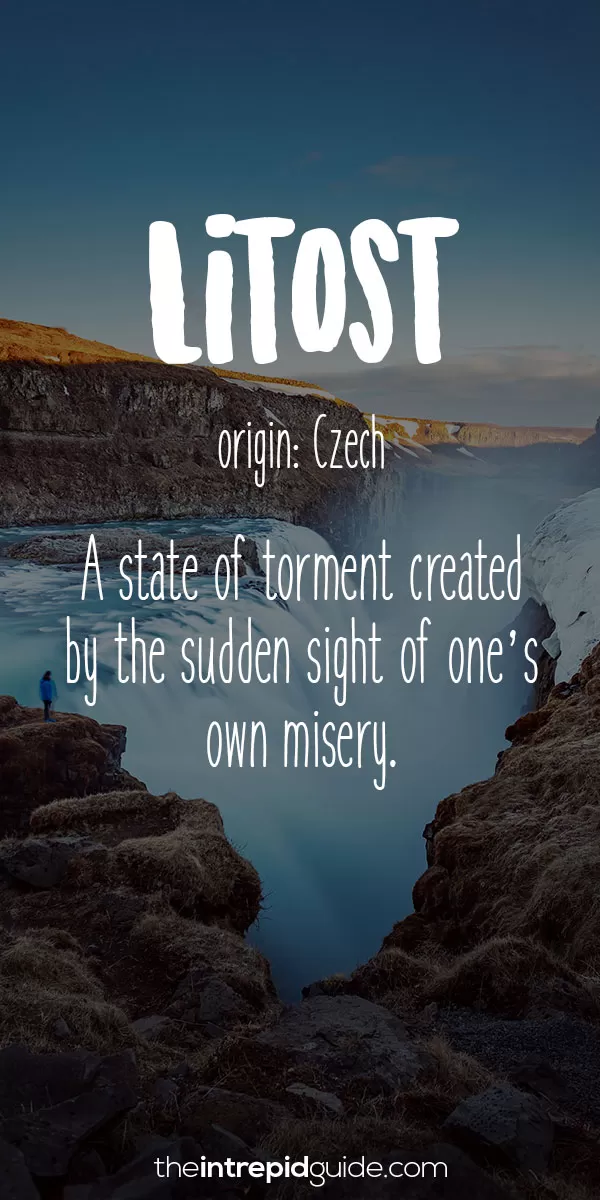
Mít kliku – This Czech verb means to have luck on your side or be lucky enough to achieve something. It literally means, ‘to have a door handle’.
Prozvonit – Prozvonitis when you call but only let it ring once so that the other person calls back without so you save money or minutes.
Learn Czech for travel! Get my free Czech travel phrase guide here.
Danish
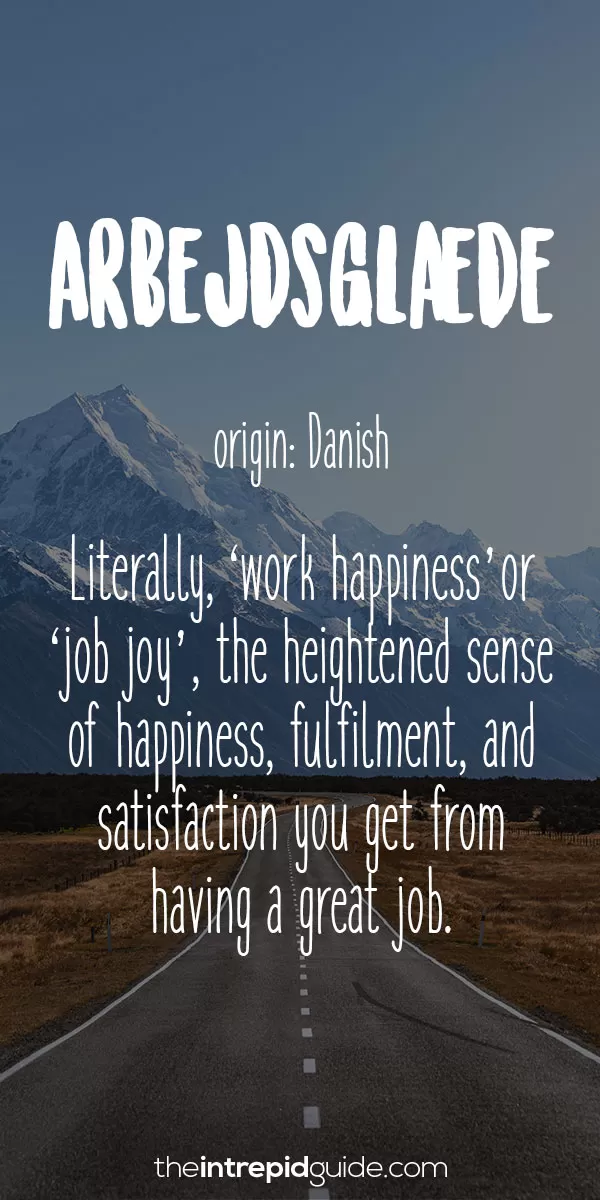

Learn Danish for travel! Get my free Danish travel phrase guide here.
Dutch

Voorpret – Voorpret is the build up of anticipation, joy or pleasure you feel ahead of the actual event such as setting up for a party and can’t help but dance as you do it. Voorpret literally means, ‘pre-fun’ but means more than just the anticipation of something fun, it’s enjoying the anticipation. It’s voorpret!
Gezelligheid – This Dutch word combines the Danish concept of hygge and the German gemütlichkeit. Gezelligheid is the idea of being in a comfortable, cozy atmosphere with loved ones, catching up with an old friend, or just the general togetherness that gives people a warm feeling. It suggests a sense of closeness that many consider encompasses the heart of Dutch culture.
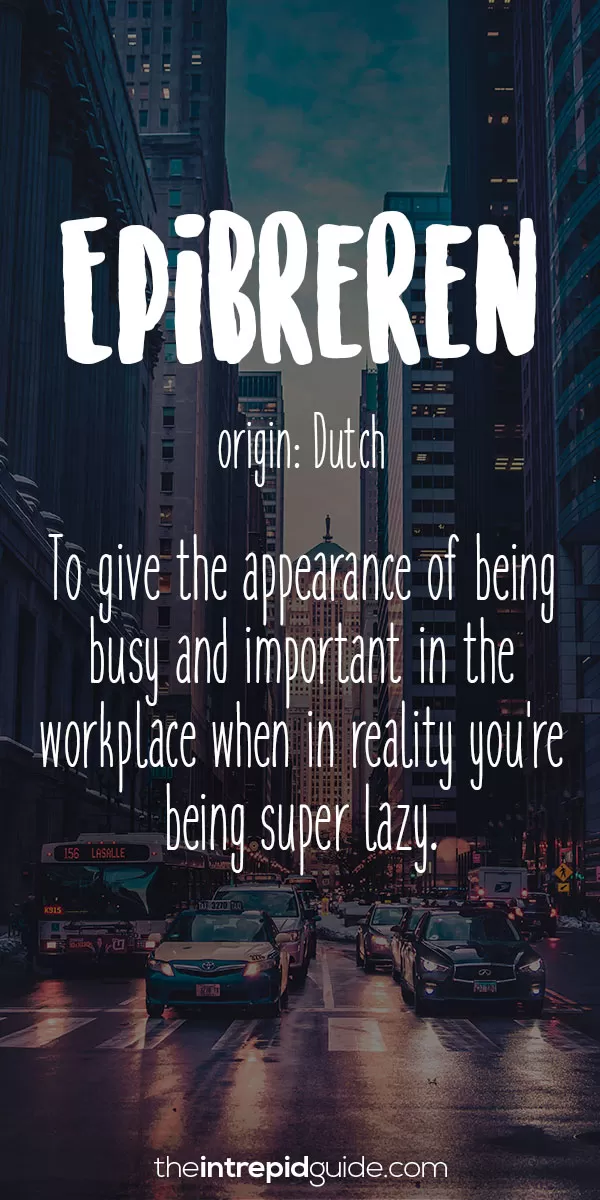
Learn Dutch for travel! Get my free Dutch travel phrase guide here.
Estonian

Finnish

Jaksaa – A severe absence of enthusiasm to do something. When you just don’t have enough strength, will power to do something or can’t be bothered.
Kaamos — Kaamos is more than just Polar Night when there are 24 consecutive hours of darkness, kaamos describes the longing for sunshine, and a feeling of depression and lack of motivation and enthusiasm. It signifies long dark days and bad weather, no social life, and a lack of inspiration.
Lieko – A trunk of a tree that has submerged to the bottom of a lake.
Myötähäpeä – Experiencing a shared embarrassment or shame when seeing someone else do something embarrassing. Myö means ‘we,’ myötä means ‘with’ and häpeä is ‘shame’, so it can be roughly translated to something like ‘co-embarrassment’ or ‘secondhand embarrassment’.

Sauna – A sauna is a small room used as a hot-air or steam bath for cleaning and refreshing the body. Saunas were invented in Finland several millennia ago and are still a cornerstone of Finnish culture, as well as of every Finnish home. So much so that, traditionally, when people moved they used to build the sauna first, and only then the house.
Sisu – Sisu is a Finnish concept that describes a stoic resilience, determination and hardiness considered to be necessary to face the difficulties of life in general and of life in harsh conditions in particular. This Finnish term that can be roughly translated as strength of will, determination, perseverance, and acting rationally in the face of adversity. Sisu isn’t momentary courage, but the power to sustain that courage to see something through.
Tokka – Pronounced [talk-uh] is a Finnish collective noun for a large herd of reindeer. It is said that there are as many reindeer as there are people in Finland.
Learn Finnish for travel! Get my free Finnish travel phrase guide here.
French
Bérézina – A sense of panic associated with a huge defeat. The word Bérézina is used in the French idom ‘C’est la Bérézina’ meaning a complete defeat, loss. The origin of this expression dates back over 200 years to the banks of the river Berezina in Belarus. It was here that a fierce battle took place between Napoleon’s retreating army and the Imperial Russian army. The battle ended in a victory for the Russian Empire and heavy losses for the French.
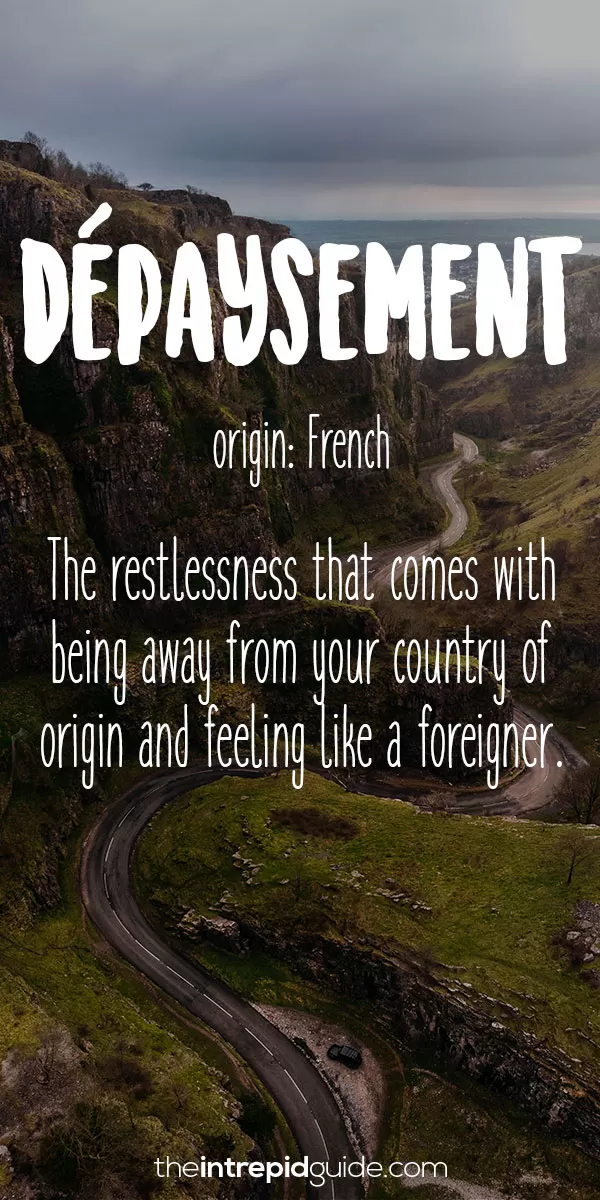
Bricoleur — A bricoleur is a handyman who uses whatever materials he can get his hands on to create a construction (or bricolage). Think of the well-known term Bric-à-brac – miscellaneous objects and ornaments of little value. The closest equivalent in English would be something like a DIY-er.
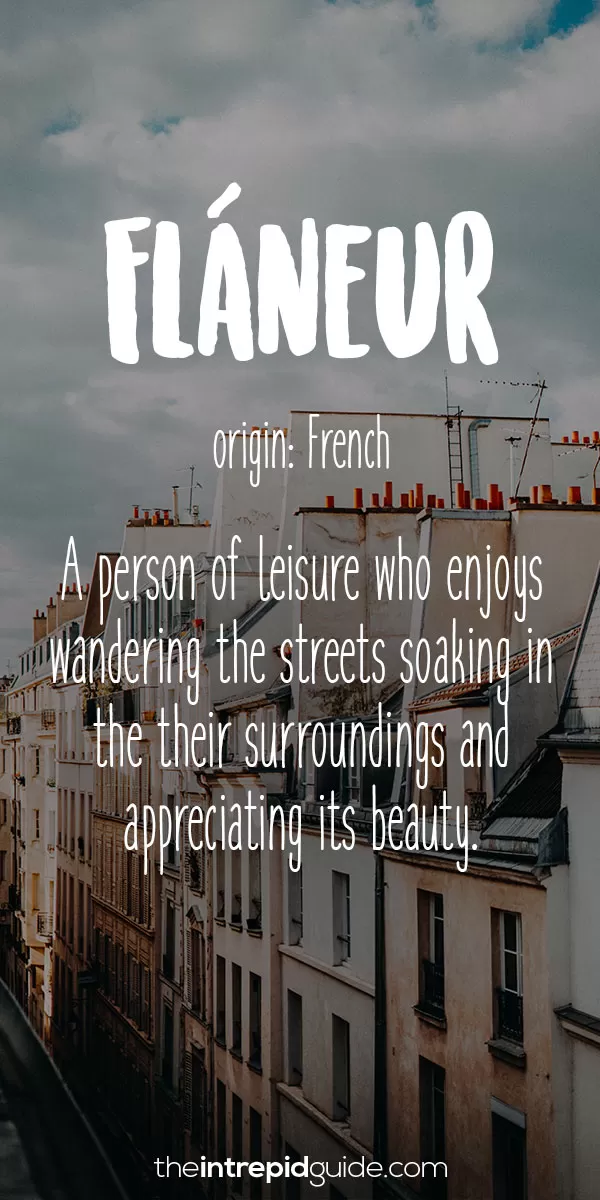
La douleur exquise – If French is the language of love, then it seems only fitting that it has a term to describe all the feelings associated with unrequited love. La douleur exquise literally means ‘the exquisite pain’, the pain of wanting something you can’t have, such as someone who will never return your feelings.
L’appel du vide – L’appel du vide is that little voice in your head telling you to do something stupid like jerking the steering wheel to the right and take a flying leap off the edge or staring out at the view from a balcony and have a sudden urge to jump over the ledge. In English, you might refer to it as the call of the Siren song.
L’esprit de l’escalier – Literally ‘stairwell wit’, l’esprit de l’escalier is the feeling that you’ve got the perfect comeback, but you think of it too late. Similar to the German, treppenwitz, mentioned earlier.
Retrouvailles – This beautiful French word means ‘refindings’, referring to the reunion you would have with someone you care deeply for but haven’t seen in a long time. The English word ‘reunion’ doesn’t quite capture this intense feeling.
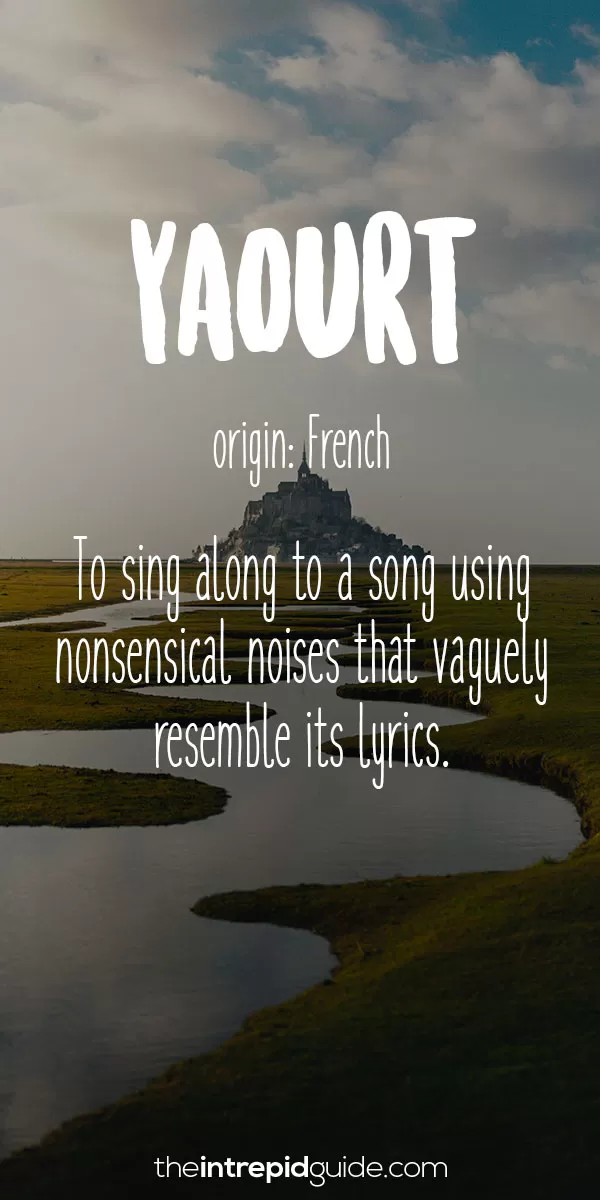
Learn French for travel! Get my free French travel phrase guide here.
Georgian
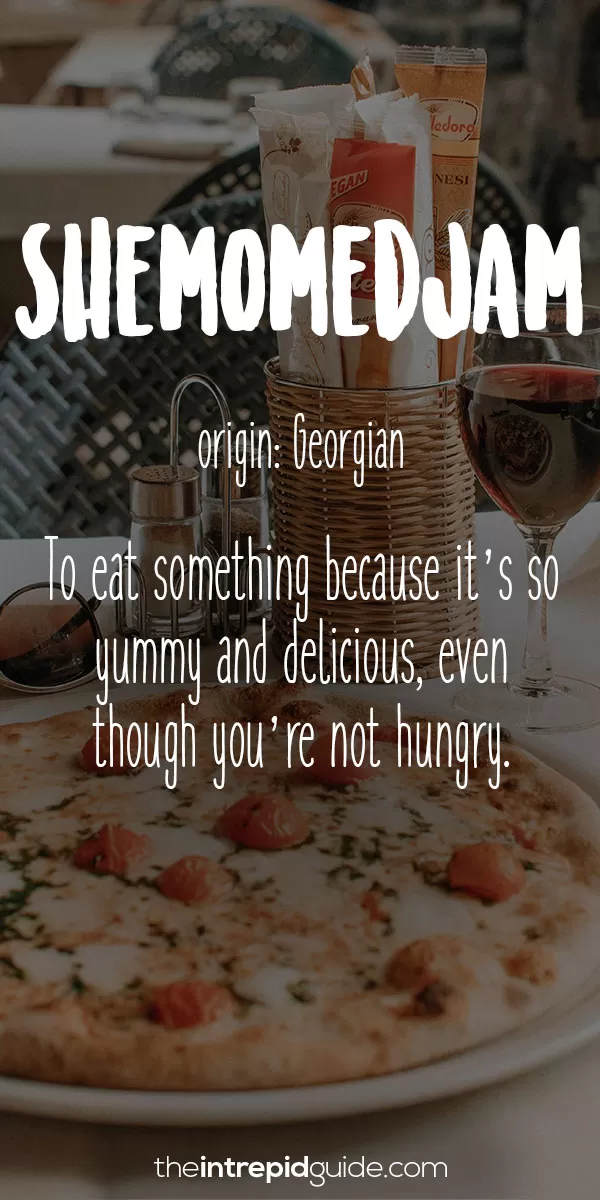
German
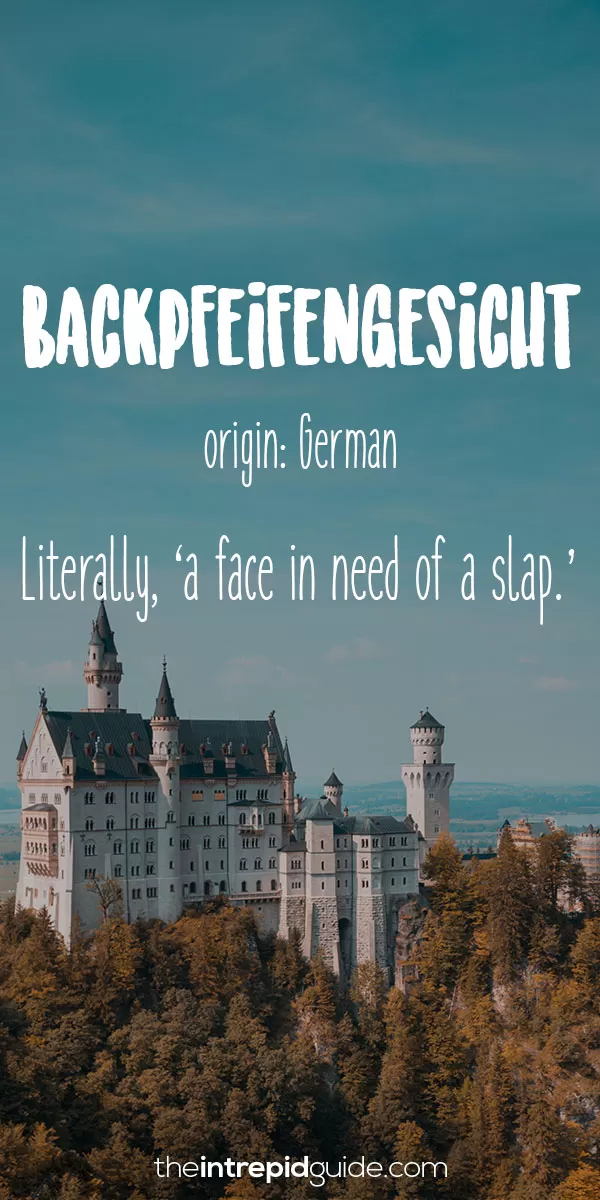
Drachenfutter – Literally, ‘dragon fodder’, this is a gift someone gives to placate and apologise to someone, especially a spouse, after they’ve done something wrong or stupid.
Erklärungsnot – The urgent need to explain something, either yourself or the situation. It can also mean to struggle explaining something. Erklärungsnot is made up of the German words Erklärung (‘explanation’) and not (in this case, can be translated as ‘need.’)
Extrawunsch – A term used to call someone who complicates things by being fussy or picky, and thus slows things down.
Fachidiot – Fachidiot, literally it means ‘subject-idiot’. A fachidiot is a person with expert knowledge in their own field and are well-accomplished but are clueless when it comes to anything outside that area.

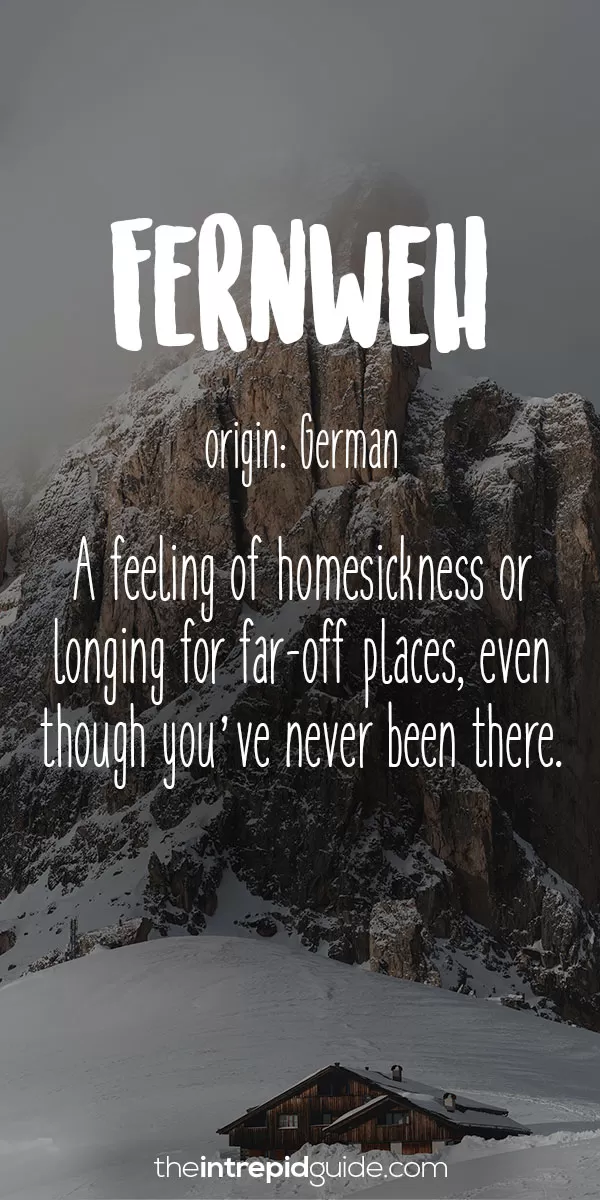
Fisselig – This represents a temporary state of sloppiness, usually elicited by a person’s nagging. This often means that a person is flustered to the point of incompetence.
Kabelsalat – Kabelsalat literally means, ‘a cable salad’, a beautiful word to describe the mess of tangled cables.
Handschuhschneeballwerfer – Handschuhschneeballwerfer is German slang for ‘coward’. It literally means, ‘someone who wears gloves to throw snowballs’. In other words, a cowardly person who criticises and abuses something from a safe distance.
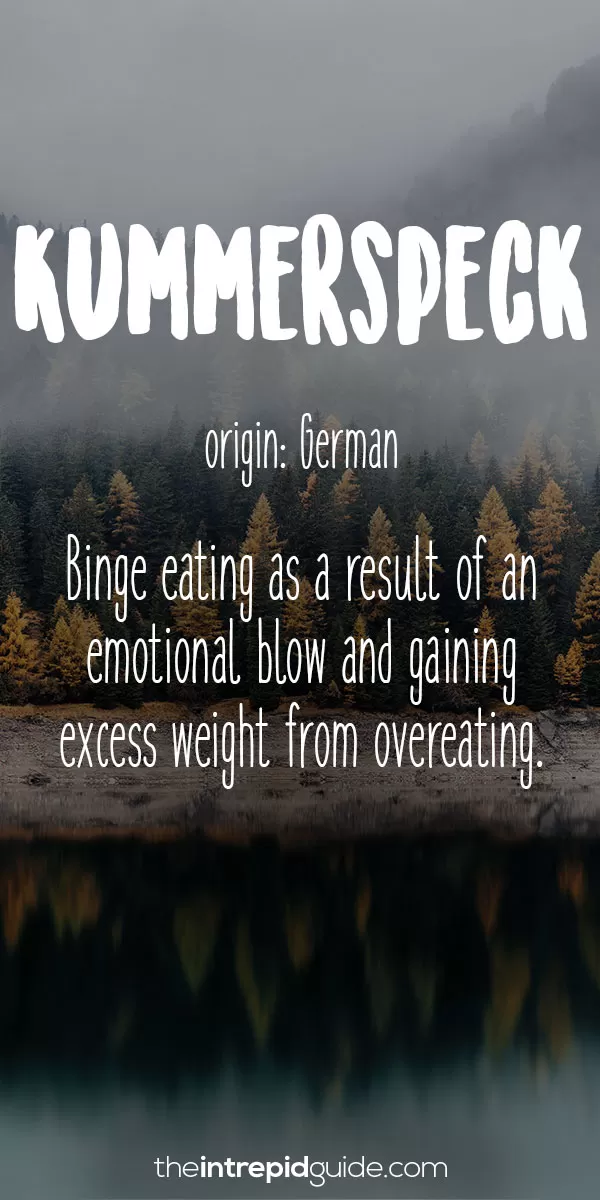
Lebensmüde – Lebensmüde is a German compound noun made up of the words leben (life) and müde (tired), and literally means ‘life tired’. It describes the feeling of being tired or weary of life. Its closest English equivalents are probably world-weary, depressed, fed up, restless and dissatisfied.
Schadenfreude – A feeling of joy and pleasure that comes with seeing another’s misfortune. Usually. someone you really dislike.
Schilderwald – A street that is so overcrowded and rammed with street signs, that you’re more prone to getting lost rather than finding your way.
Schlimmbesserung – Something that was meant to be an improvement, but actually makes things worse.
Schnapsidee – Literally, ‘schnapps idea’, is a plan so ridiculous you must have been drunk when you thought it up.

Torschlusspanik – This beautiful word is used to refer to the feeling you experience at a certain point in your life where you see an imaginary door closing on all your opportunities, and you wonder what could have been. Tor means ‘gate,’ schluss means ‘closing’ or ‘ending,’ and panik means, ‘panic.’ So, torschlusspanik literally translates to ‘gate closing panic.’
Treppenwitz – Possibly the most useful untranslatable word on this list, treppenwitz describes all the things you should have said in the heat of the moment but only think of when it is too late. Also known as, the best comeback line you never said.
Waldeinsamkeit – The feeling of being alone in the woods. Derived from two German words ‘wald,’ meaning forest, and ‘einsamkeit,’ meaning loneliness, it refers to a connectedness with nature and the peace experienced in that moment.
Weichei – Weichei is a German slang term which used to refer to a cowardly person. Literally meaning ‘a soft egg’, the closest English equivalent would be ‘wimp’.
Weltschmerz – The literal translation of the word is ‘world grief’, or ‘world-pain’, a term first coined by the German author Jean Paul. Weltschmerz refers to a deep sadness about the imperfection and pain of the world.
Verschlimmbessern – Verschlimmbessern describes the act of trying to make something better, only to end up making it worse than it initially was. In English, you might say something like ‘to put your foot in it’.
Learn German for travel! Get my free German travel phrase guide here.
Greek
Filotimo (φιλότιμο) – Filotimo is almost impossible to translate but can be summed up as ‘love of honour’. It describes a person who understands the responsibility to themselves, as a human, being to always do the right thing and with honour. Even if their wealth, safety, freedom, or even life is at peril. No matter what, this person will do the honourable thing, regardless of the consequence.
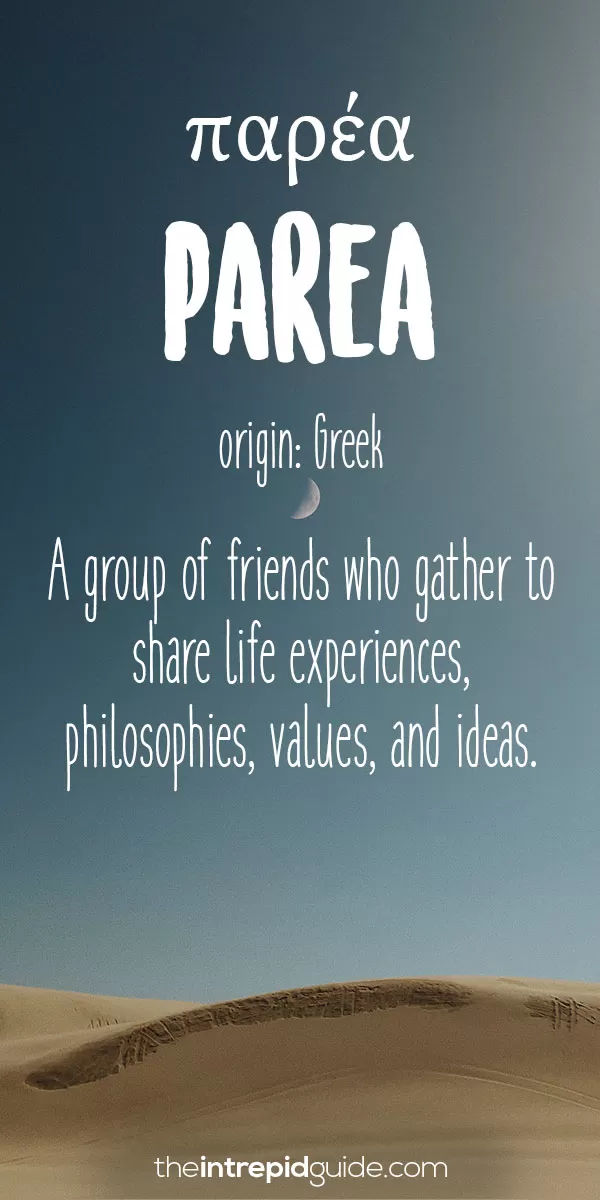
Psithurism (Ψυθισμός) – Psithurism is the rustling sound of leaves in the wind. It comes from the Greek psithuros, meaning ‘whispering, slanderous.’
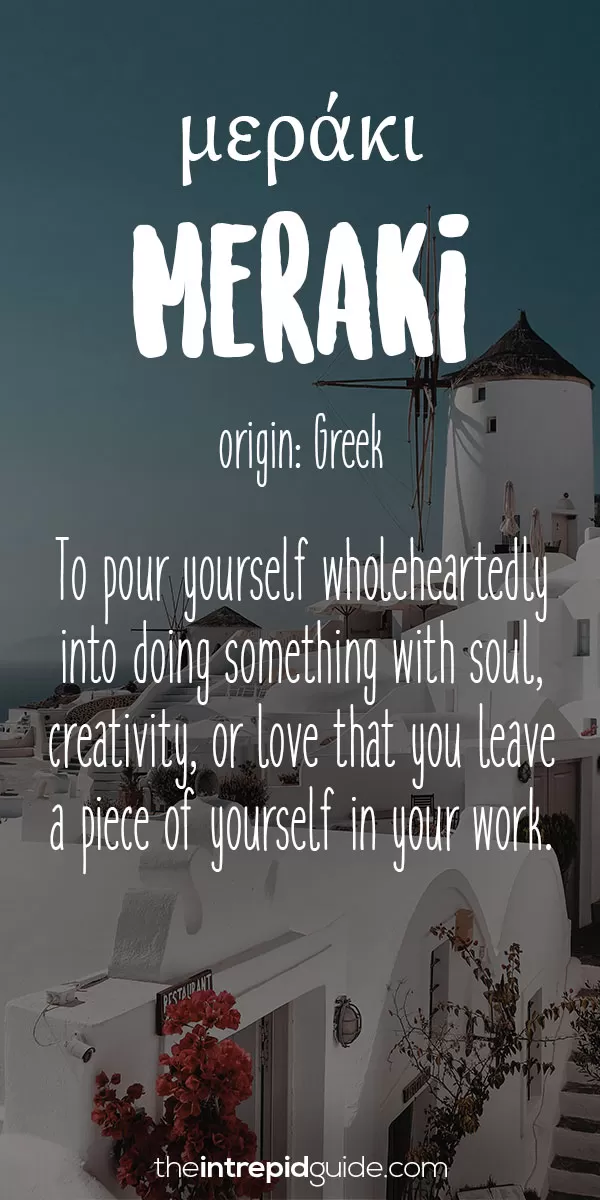
Learn Greek for travel! Get my free Greek travel phrase guide here.
Hawaiian

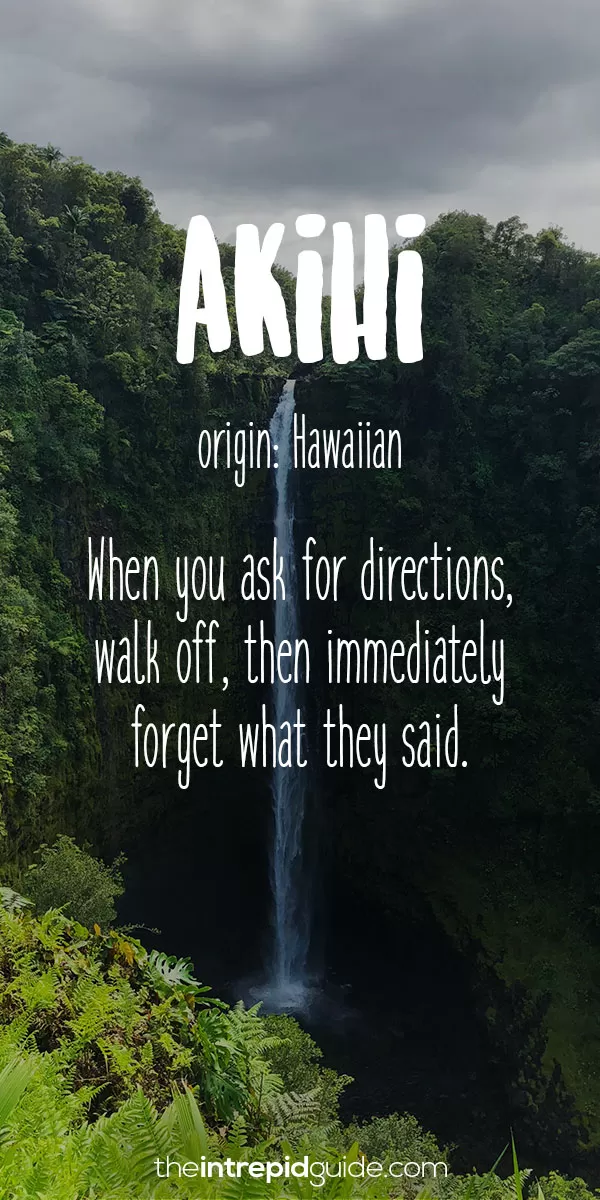
Hebrew
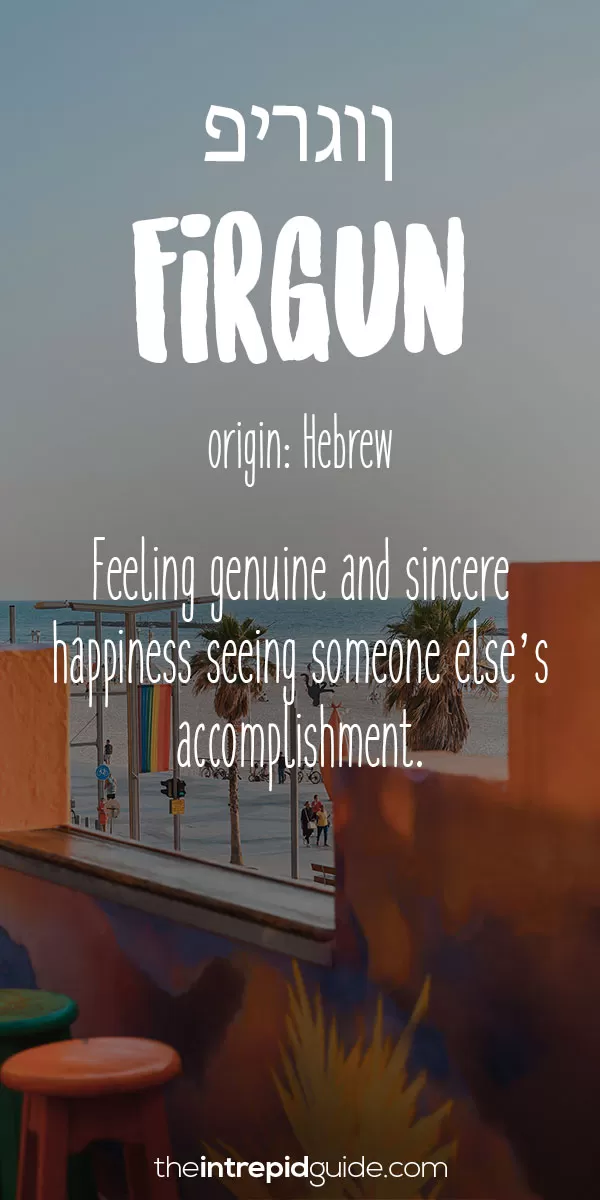
Learn Hebrew for travel! Get my free Hebrew travel phrase guide here.
Hindi
Chai-Pani (चाय पानी)– The phrase ‘Chai-Pani’ literally meaning, ‘tea and water’, is used to offer welcome drinks and facilitate guests in houses of India. It can also refer to a bribe given to someone, often a bureaucratic worker, to get a job done quickly.

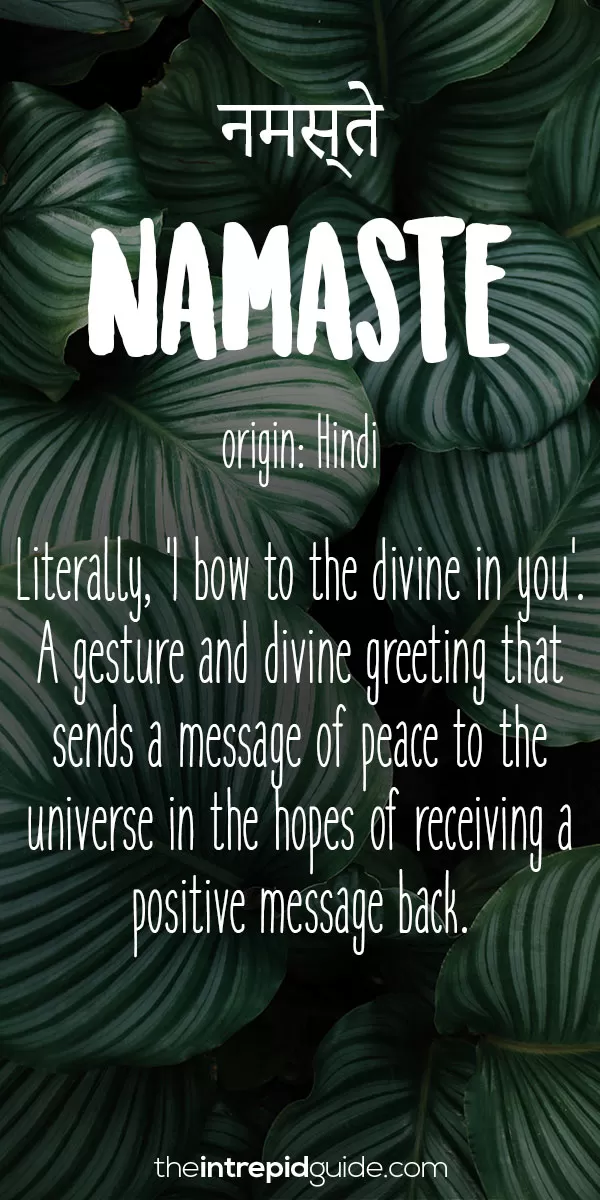
Viraha (विरह) – Realising you love someone only after you’re separated.
Learn Hindi for travel! Get my free Hindi travel phrase guide here.
Hungarian
Elmosolyodni – A kind of smile that forms when something isn’t especially funny, but you can’t help but smile anyway.
Házisárkány – A nickname for your spouse or better half who is constantly nagging. It literally means an ‘Domestic Dragon’
Icelandic
Dalalæða – A low waist-deep fog that forms after a warm and sunny day. It literally means, ‘a fog that sneaks up from the bottom of a valley’ or ‘valley-sneak.’
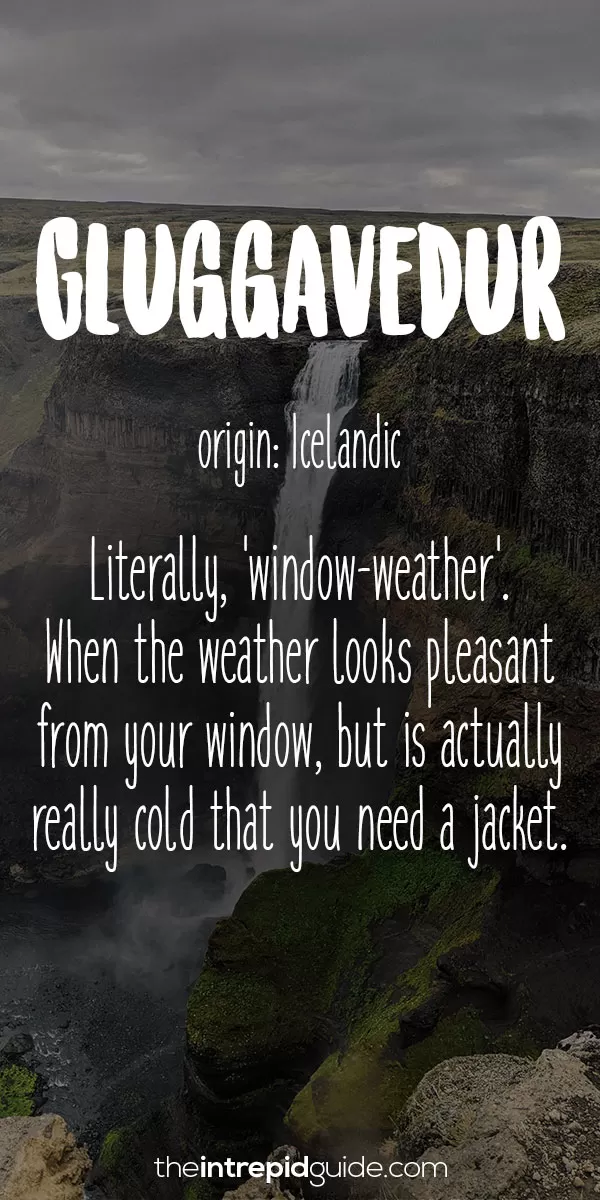
Þetta reddast – Pronounced [THETTA red-ahst], Þetta reddast is Iceland’s unofficial motto that loosely translates as ‘everything will work out in the end’.
Tima – Being unwilling to spend time or money on a particular thing, even though you can afford it.
Learn Icelandic for travel! Get my free Icelandic travel phrase guide here.
Indonesian
Jayus – A joke so terrible and unfunny that you can’t help but laugh. It’s funny because it’s not funny, kind of like a dad joke.
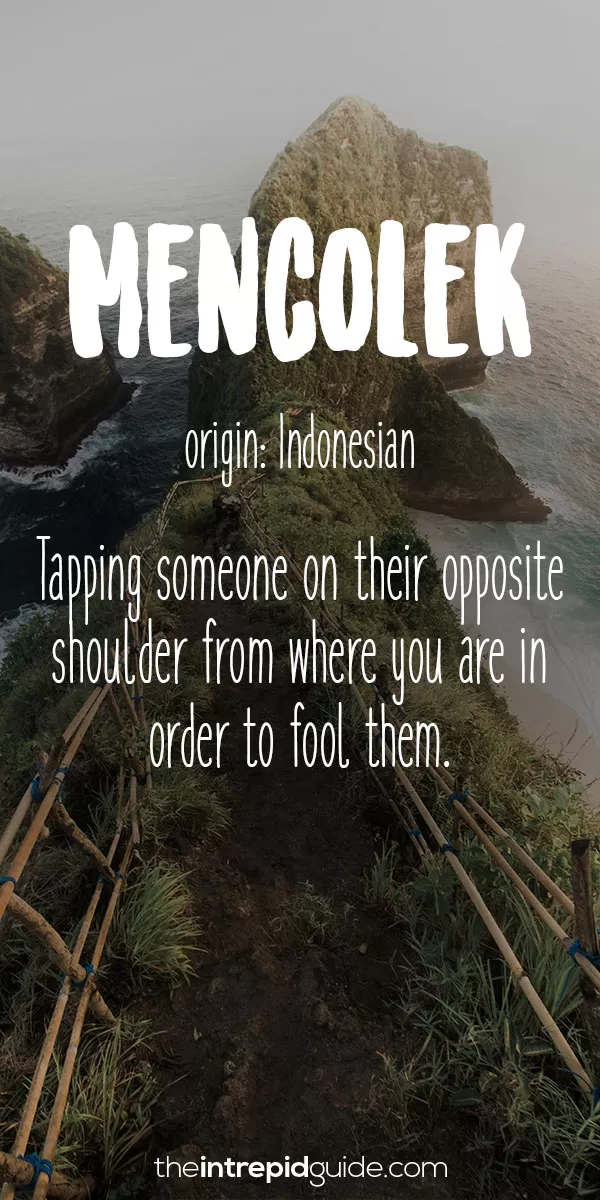
Inuit
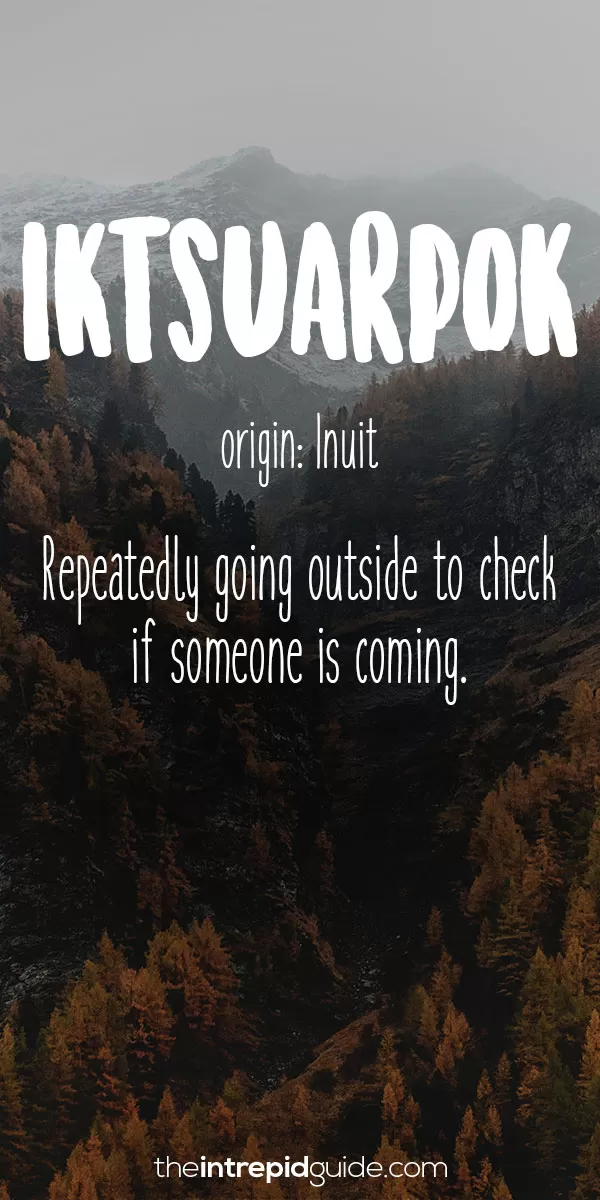
Irish
Cúbóg – A batch of Easter eggs.
Learn Irish for travel! Get my free Irish travel phrase guide here.
Italian
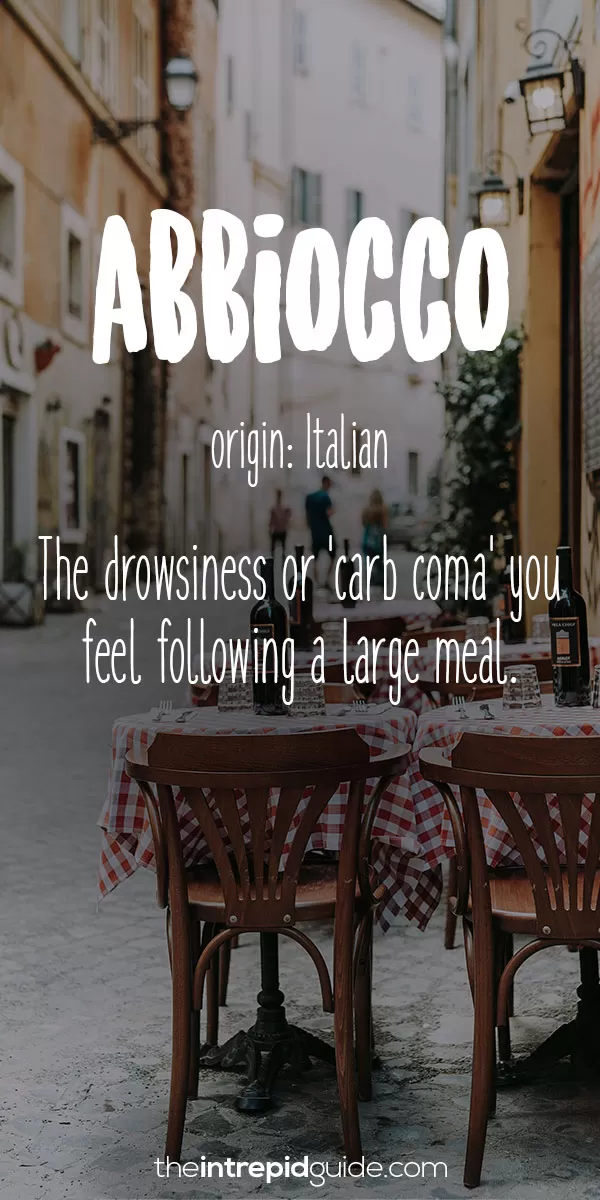
Attaccabottoni – Literally, ‘attach buttons’, an attaccabottoni is a chatty person who corners you to tell you long, meaningless stories, in endless detail about their life.
Cavoli riscaldati – Literally reheated cabbage, this is essentially an attempt to reheat an old romance. In other parts of Italy, ‘minestra riscaldata‘ or ‘zuppa riscaldata’, meaning reheated soup, is used to describe the same sentiment.
Commovente – Often translated as ‘heartwarming,’ but it directly refers to being moved to tears. The verb commuovere means to move, to touch, to stir emotions.
Culaccino – Culaccino refers to the dregs in a glass but also the residue or water ring left on a surface by a moist, cold glass or other small container. In Italian, ‘culo‘ means bottom.
Gattara – A woman devoted to caring for and feeding stray or domestic cats. A more extreme version of a cat lover.
Fare la scarpetta – To finish up the contents of your plate, especially the sauce, with a piece of bread.
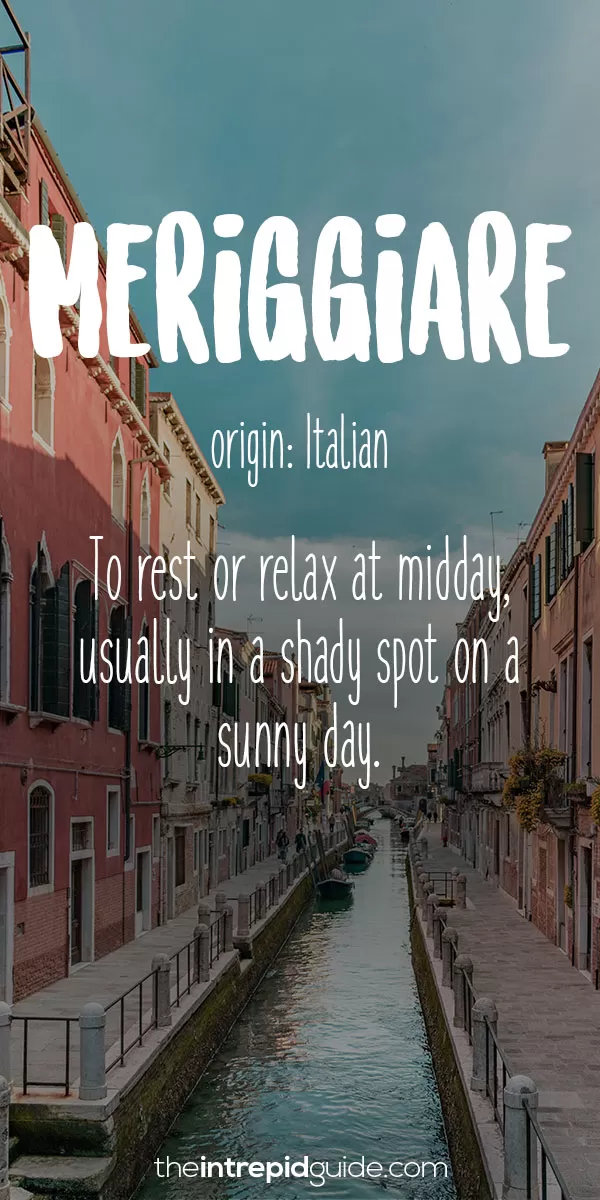
Learn Italian for travel! Get my free Italian travel phrase guide here.
Japanese
Age-otori (上げ劣り) – Pronounced [aah-gey-oh-toh-ree], Age-otori is a beautiful Japanese word that perfectly sums up a disaster haircut that makes you look worse than before.
Arigata-meiwaku (ありがためいわく) – This is used to refer to an act that someone does for you, even though you didn’t want to have them do it and tried to avoid having them do. They might have gone ahead, determined to do you a favour, then things going wrong, causing you a lot of trouble. In spite of this, social conventions required you to still express gratitude. What a mouthful! Yet the Japanese have a simple concise term that says it all in just 2 words, arigata-meiwaku.
Bakku-shan (バックシャン) – This dating slang term literally means ‘back beautiful’ and is used to describe a girl who is beautiful, as long as you’re looking at her from behind! Harsh! An English equivalent could be either ‘good from afar, but far from good’, or ‘Butter face’ – where everything but her face is attractive). What makes this Japanese word so interesting is that it’s not Japanese at all, it’s a composite of バック (bakku, ‘back’, from English back) and シャン (shan, ‘beautiful’, from German schön).
Boketto (ぼけっと) – Gazing vacantly into the distance without thinking of anything specific, in other words, daydreaming.
Chindōgu (珍道具) – A prank originating from Japan, which is done by a person seemingly inventing ingenious everyday gadgets that seem like an ideal solution to a particular problem, but are in fact nothing more than a useless gag. Literally translated, chindōgu means unusual (珍, chin) tool (道具, dōgu).

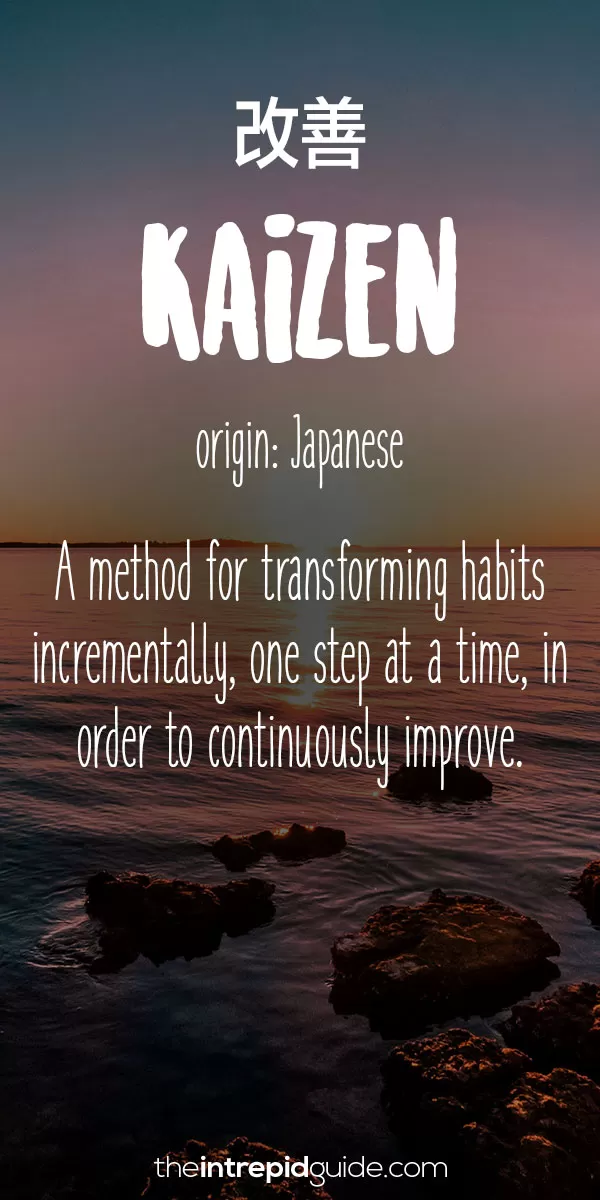

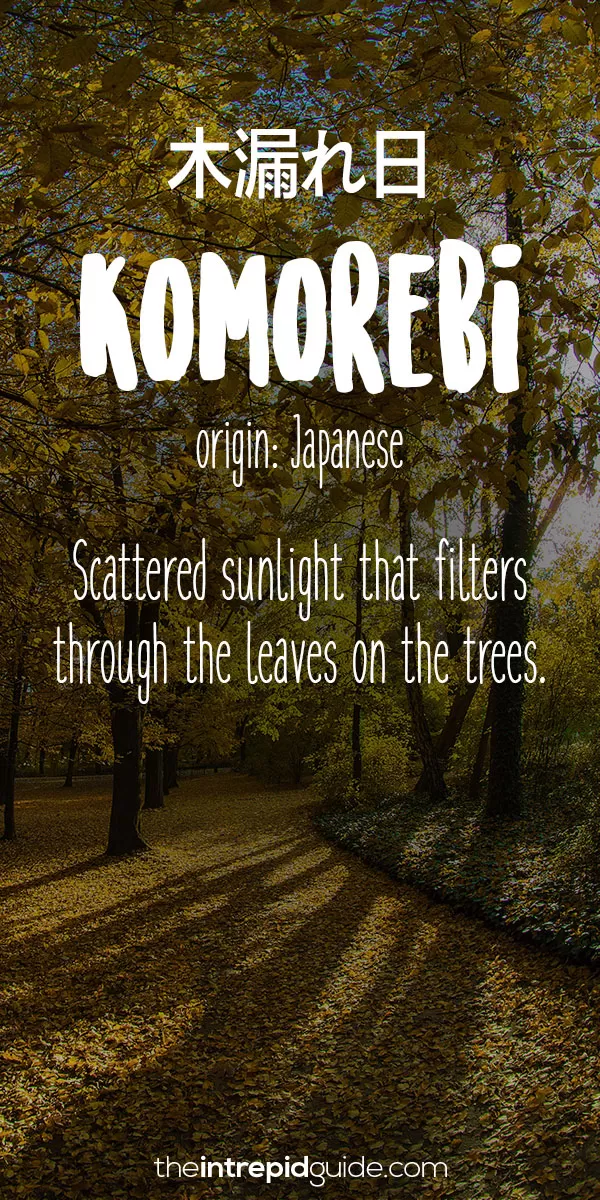
Kyōiku mama (教育ママ) – Pronounced [ky-oh-ee-kuu-mama], Kyōiku mama is an offensive Japanese term used to describe a mother who relentlessly pushes her children to achieve academic excellence. It literally translates to ‘education mother’.
Mono no aware (物の哀れ) – Literally ‘the pathos of things’, and also translated as ‘an empathy toward things’. The term Mono no aware was coined by Motoori Norinaga, an eighteenth century literary scholar, who combined aware, which means sensitivity or sadness, and mono, which means ‘things.’ Norinaga believed that this feeling was at the very centre of Japanese culture.
Nekama (ネカマ) – Nekama refers to a certain type of male, who in their normal daily life are usually heterosexual, however, online they represent themselves as female. Thus, this term commonly refers to a man pretending to be a woman on the internet, regardless of his sexuality.
Shouganai (しょうがない) – A Japanese philosophy that states that if something is meant to be and cannot be controlled, then why worry about it? The idea is that worrying won’t prevent the bad things from happening; it will only deprive you of the joy of enjoying the good things in life. Translated literally, shouganai means ‘it can’t be helped’.
Tatemae (建前) and Honne (本音) – Tatemae has the specific cultural meaning. It refers to the behaviour that Japanese people adopt in public, according to what is socially accepted or not by Japanese society. It could be translated as the ‘public facade’. Privately held views that you would never admit in public is called honne.
Tsundoku (積ん読) – How many times have you bought a book but never read it? This is called tsundoku, a beautiful word used to describe the act of buying books but letting them pile without ever reading them. The term originated in the Meiji era (1868–1912) as Japanese slang. The word consists of tsunde-oku (積んでおく, to pile things up ready for later and leave) and dokusho (読書, reading books). It is also used to refer to books ready for reading later when they are on a bookshelf.
Wabi-Sabi (侘寂) – This is a beautiful Japanese concept that represents finding beauty in imperfections. It allows us to accept that growth and decay are a natural process. In traditional Japanese aesthetics, wabi-sabi is a world view centered on the acceptance of transience and imperfection. Wabi-sabi is a concept derived from the Buddhist teaching of the three marks of existence (三法印, sanbōin), specifically impermanence (無常, mujō), suffering (苦, ku) and emptiness or absence of self-nature (空, kū).
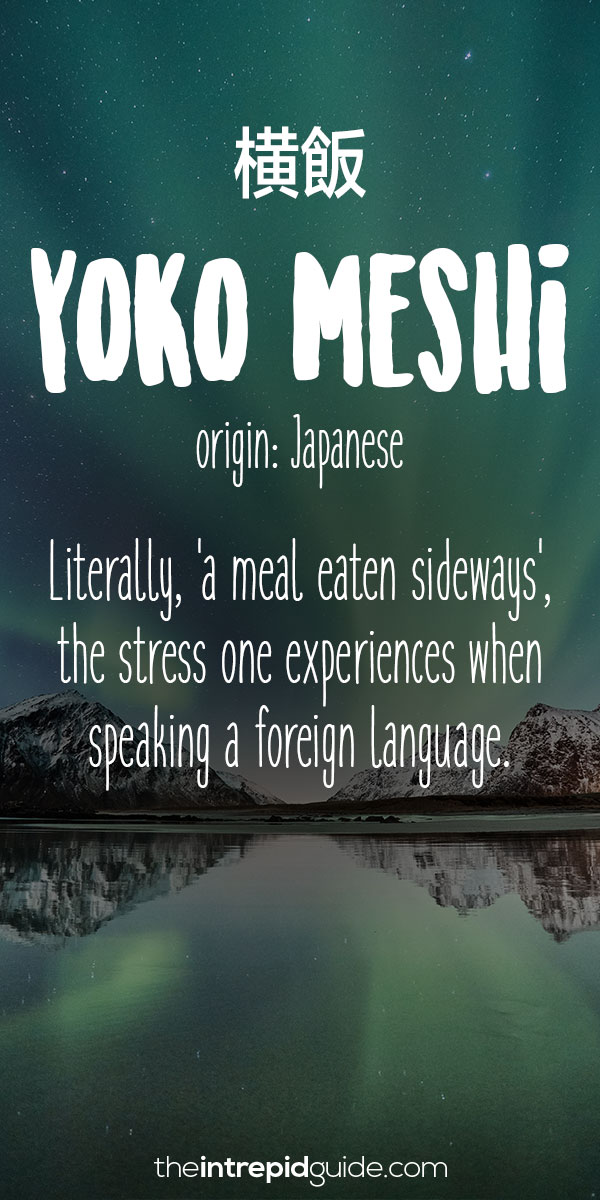
Yūgen (幽玄) – Yūgen is an important concept in traditional Japanese aesthetics. It refers to the sad beauty associated with human suffering, coupled with a sense of profound mysterious sense and beauty of the universe.
Related: 69 Wonderful Japanese Expressions That Will Brighten Your Day
Kivila
Mokita – From the Kivila language native to Papua New Guinea, mokita is a commonly known truth that no one wants to admit or talk about.
Korean
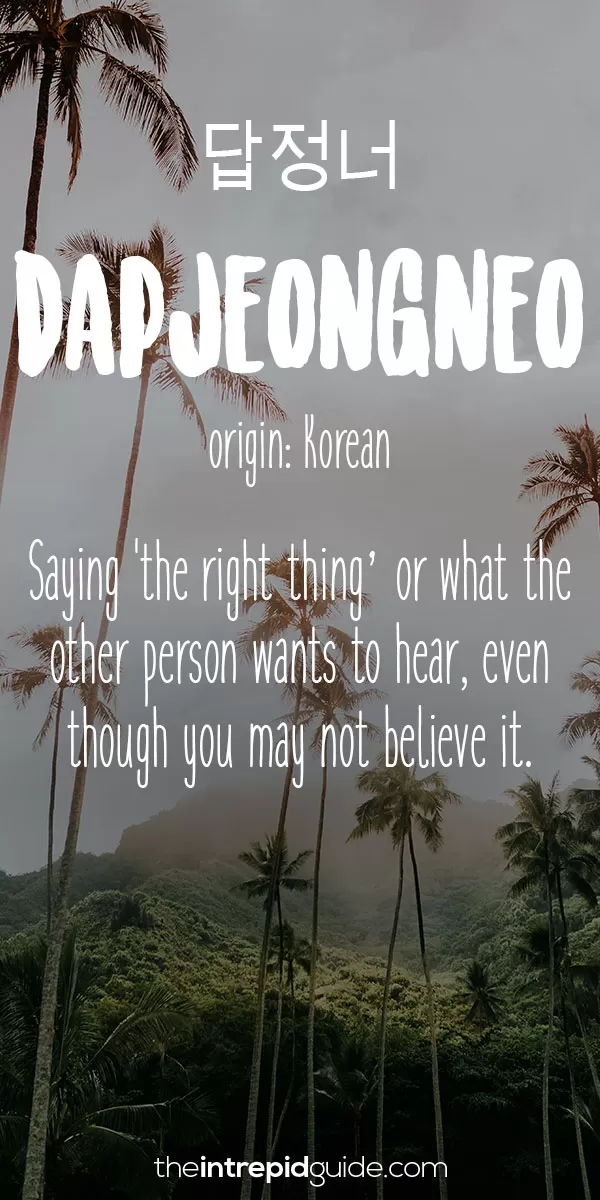
Gosohada (고소하다) – The feeling you get when someone finally gets what they deserves. When you think to yourself ‘HA serves you right!’, that’s Gosohada.
Gilchi (길치) – What you call someone who has a terrible sense of direction and who constantly gets lost.
Hyo – Pronounced [hee-yo], this is both a name meaning ‘dutiful’ and a term to describe the sense of duty children have towards their parents and the expectation that they may need to make sacrifices for them out of respect.
Latvian
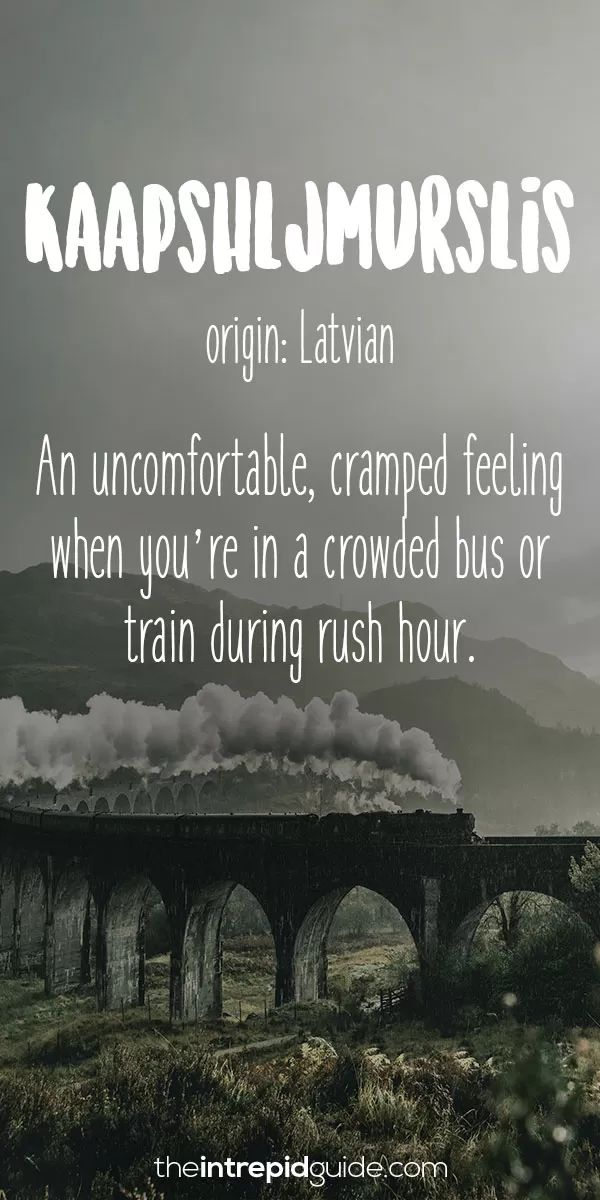
Lithuanian
Nepakartojama – A never-to-be-repeated perfect situation. Directly translated, it means ‘unable to repeat’
Malay
Manja – Manja is a person who shows so much outward love and affection towards someone they care about, like a spouse, partner, or child, to the point where they are pampering or spoiling them
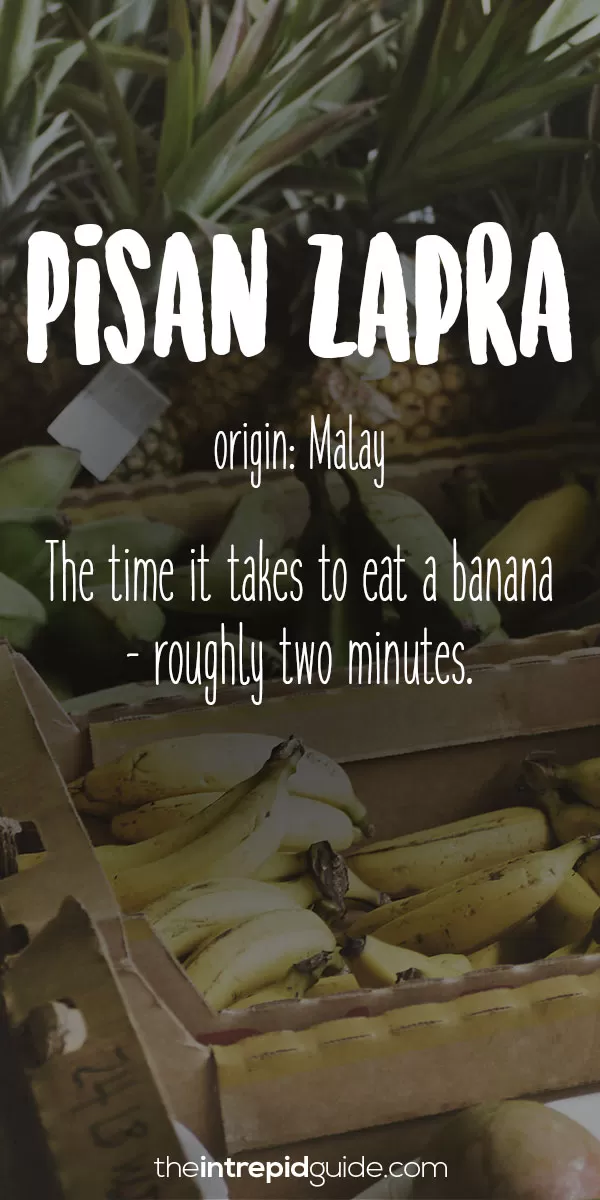
Māori (Cook Islands Maori)
Papakata – To have one leg shorter than the other.
Norwegian
Dugnad – Is a type of community day where Norwegians get together to help clean up their neighbourhoods by fixing, cleaning, painting or just tidying things up. A dugnad takes place around the change in seasons. Every Norwegian has participated in a dugnad. It’s a great occasion to socialise with your neighbours, which – if you live in Norway – you will know is pretty rare. The added benefit is that a dugnad is usually accompanied by kaffe og kaker (coffee and cakes).
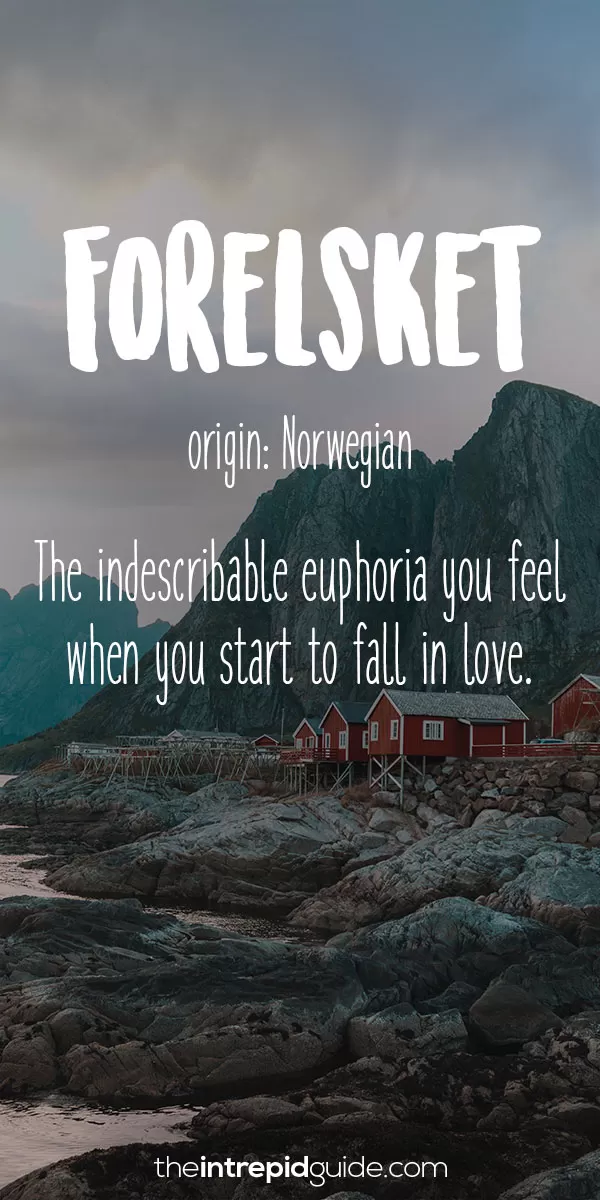
Pålegg – Anything that you can put on top of open-faced sandwiches, such as brun øst (Norwegian Cheese) cold cute, tomatoes, lettuce, spreads or other topping.

Uffda! / Uff da! – Is a versatile interjection and expression which basically means ‘Oh, I’m sorry to hear that’. It expresses surprise, astonishment, exhaustion, relief, and can be used to express empathy. It means a combination of ‘Ouch for you!’ and ‘I’m so sorry that you hurt yourself’. Within Scandinavian-American culture, Uff da often translates to, ‘I am overwhelmed’.
Yr – Yr can only be described as a very specific kind of rainfall with tiny, almost floating raindrops (or snowflakes). It’s similar to drizzle or mist but one as one Norwegian puts it ‘It paints a picture not only in how it’s spelled but how it’s said, it’s more a sound than a word. Also when conjugated: ‘det yrer litt‘. I see foggy whispers of misty rain in the fjords.’ (Source). I think this is the most beautiful untranslatable word I’ve learned so far since learning Norwegian.
Learn Norwegian for travel! Get my free Norwegian travel phrase guide here.
Pascuense (Easter Island)
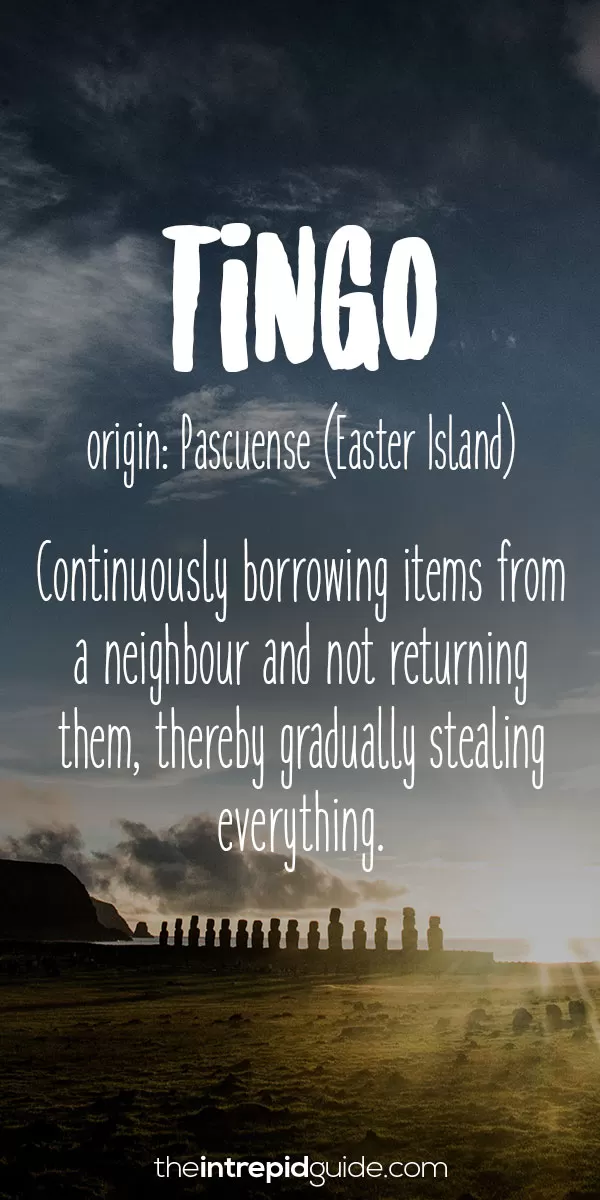
Persian
Zhaghzhagh – Pronounced [zhaang-zhaah-gh], it’s the uncontrollable chattering of teeth, either due to the cold, or from intense rage.
Polish
Dożywocie – A contract between parents and children, guaranteeing lifetime care in exchange for real estate.
Formacja – Formacja is used in colloquial speech to describe a state of mind that is widespread across a particular generation or period of time. The closest English word would be ‘zeitgeist’.
Kilkanaście – This Polish word refers specifically to any number between 12 and 19 and is used in a similar way as the English ‘umpteen’ or ‘many’, but neither translation is quite correct.
Kombinować – To make something or try to resolve a problem with the bare minimum and in an unusual way. This could be as a result of having limited access to resources or knowledge.
Radioukacz – Telegraphists who were part of the resistance movements on the Soviet side of the Iron Curtain.
Zalatwic – Zalatwic means ‘to get done’, but in a very specific way and is often either illegal or bends the rules. It involves using a bribe, political clout or connections, or simply personal charm to get the job done. This was especially common in Poland during the days of communism in Poland where it was probably impossible to live without ‘zalatwic’.
Portuguese
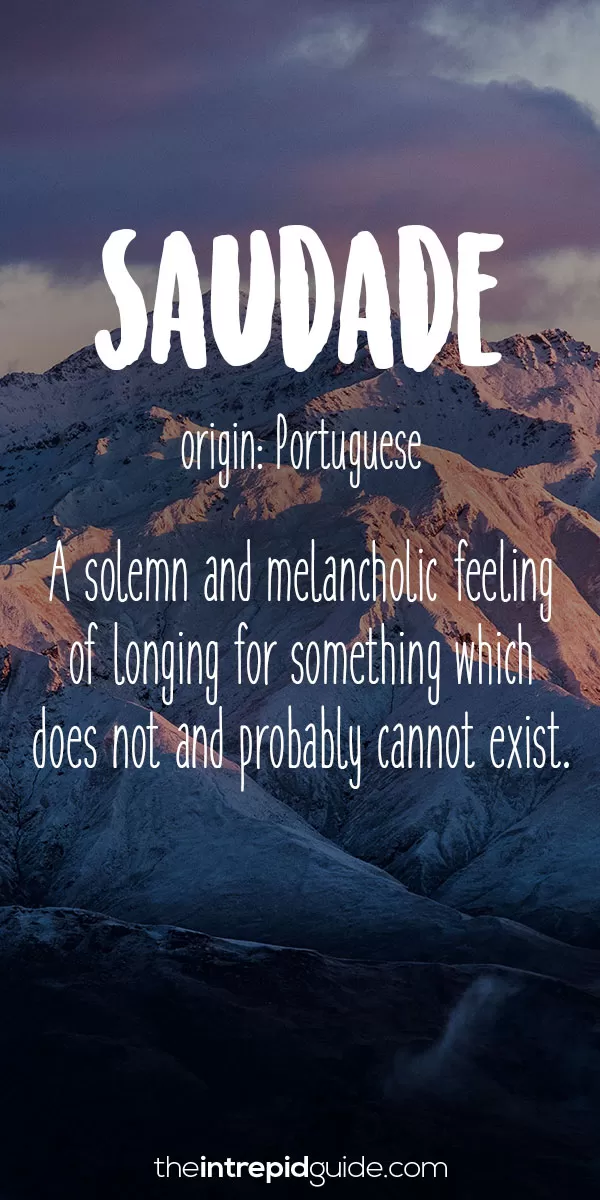
Desenrascanço – Desenrascanço literally means ‘disentanglement’, a term used in Portugal to describe the act of ‘disentangling’ oneself from a difficult situation by using all available means to solve the problem.
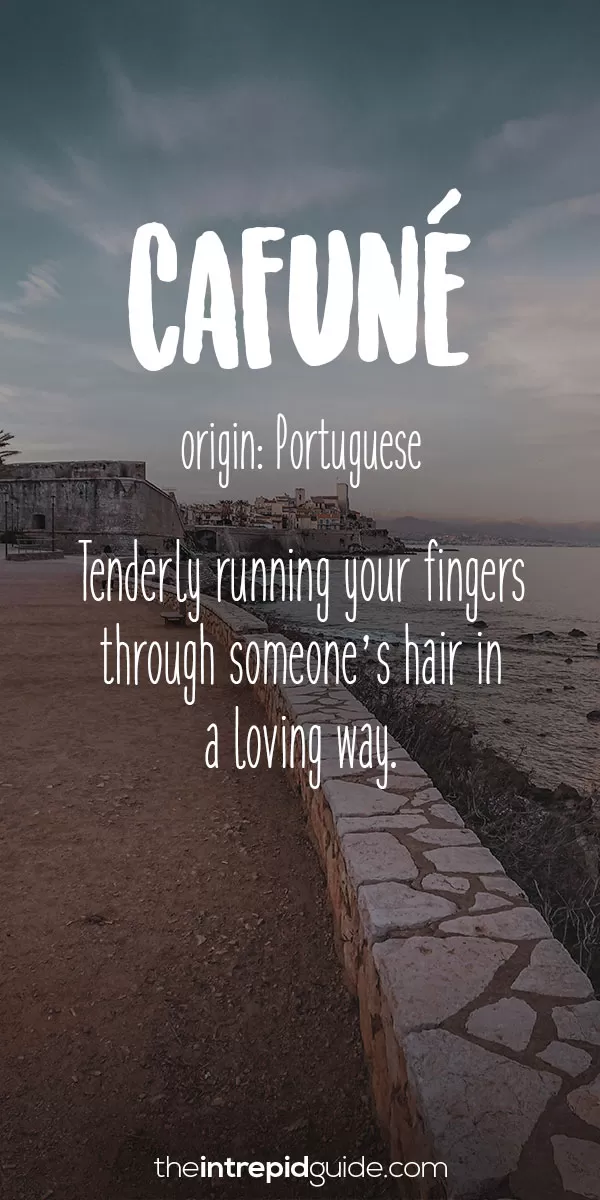
Learn Portuguese for travel! Get my free Portuguese travel phrase guide here.
Romanian
Dor – A sad longing or yearning for someone.
Soare cu Dinti – When you look out the window and it looks lovely and sunny until you actually step outside. Soare cu Dinti describes a beautiful sunny, but very cold day.
Rukwangali (Namibia)

Russian
Listopad (листопа́дъ) – The falling of leaves.
Odnoliub (однолюб) – Someone that only has one love in their life or is only capable of a single person at a time.
Pochemuchka (почемучка) – Pochemuchka is a person, usually a child, who asks too many questions. Pronounced [POH-chay-MOO-chka[, it comes from the Russian word pocemu [POH-chay-MUH], which means ‘Why?.’ Pochemuchka was first used in a popular Soviet-era children’s book whose boy hero was given the nickname Alyosha Pochemuchka because he was never satisfied with the answers he got. Pochemuchka is a light-hearted put-down that might be expressed in English with a warning like ‘curiosity killed the cat’.
Razljubit (разлюбить) – Razljubit is the opposite feeling of the Norwegian forelsket when you first fall in love. It’s the feeling you have towards someone you were once in love with. When you see or think of them, you may feel a twinge of affection, but by now it’s totally platonic. That’s razljubit.
Toska (тоска) – Toska is the feeling of anguish, sadness, or melancholia, even though there’s no specific cause. Often spiritual in nature, this is a deep sadness that touches the soul.
Zapoi (Запой) – Zapoi describes being drunk for several days and waking up in an unexpected place that you don’t recognize.
Zloradstvovat (злорадствовать) – Zloradstvovat means to be devilishly happy’, in the evil way, when seeing someone’s misfortune, pain, or loss.
Learning Russian? Check out these hilarious Russian idioms and expressions
Samoan
Faamiti – Pronounced [fah-mih-tee], faamiti is a high-pitched noise made by sucking air through tightly-sealed lips in order to attract the attention of a pet or children.
Scottish

Suilk – Pronounced [swilk], this Scottish word means to make an abnormal amount of noise whilst such as to swallow, gulp, or suck with a slobbering noise. Suilk is now used in English and even has English verb conjugations, ‘suilking‘ is the act, and a ‘suilker‘ is one who suilks.
Tartle – The moment where you hesitate when introducing someone because you’ve just forgotten their name. You’ve just tartled, so you say, ‘Pardon my tartle!’
Learn Scots for travel! Get my free Scots travel phrase guide here.
Serbian
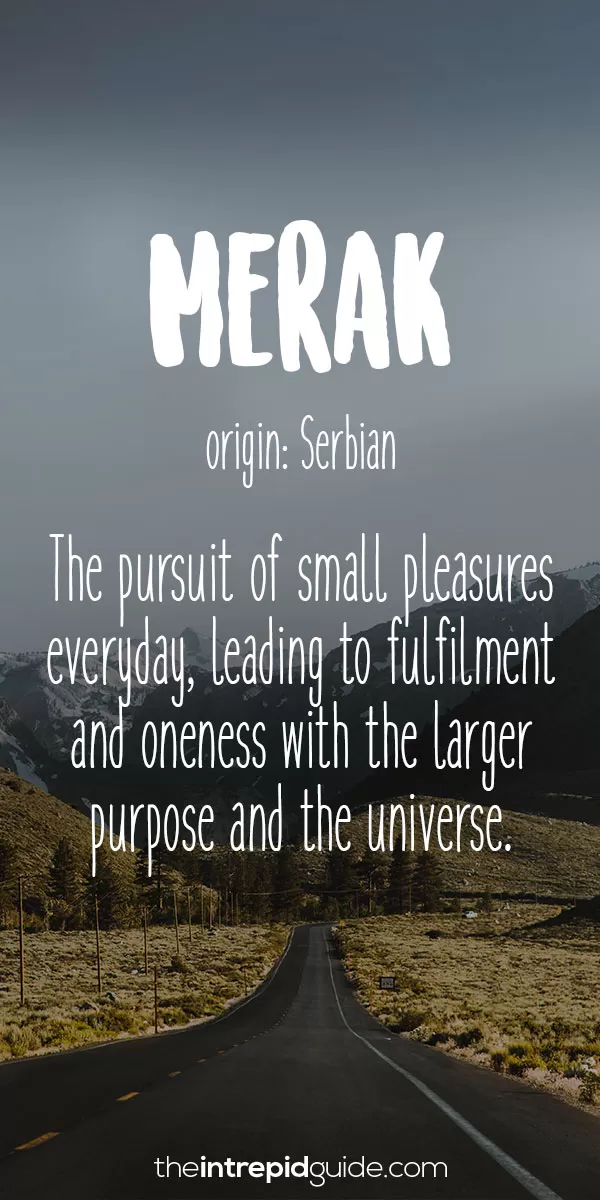
Slovenian
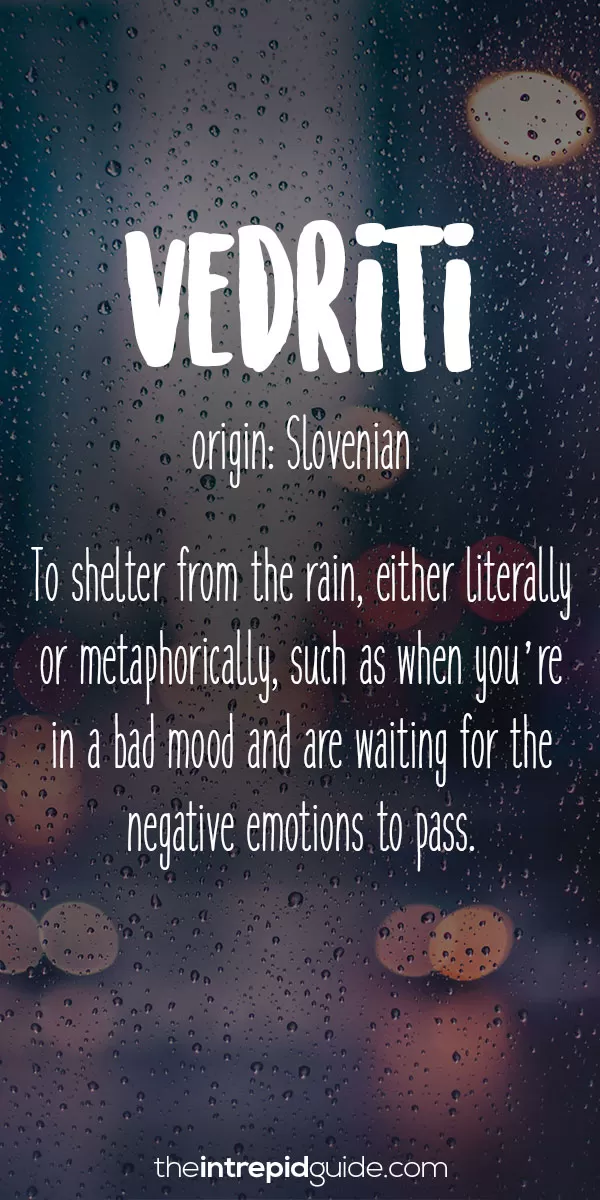
Spregledati – To simultaneously understand someone on a deeper level, whilst also overlooking it.
Spanish
Anteayer – This single word means ‘the day before yesterday’. Anteayer is made up of the Spanish word ante, meaning before or in front of, and ayer, meaning yesterday. In some parts of Latin America and rural Spain, antier is used instead.
Chingada – Chingada is a vulgar term commonly used in colloquial Mexican Spanish that shouldn’t be thrown around lightly. It can either refer to a special kind of hellish place that’s far away, where you send anyone who irritates you, like when you say ‘go to Hell’, or can be used as a variation of the f-word. Chingada stems from the verb chingar which means to ruin, annihilate, screw or f**k. Like I said, be careful how you use it, if at all!
Desvelado – While the Spanish are known for their siestas, they also have a word which means the complete opposite. Desvelado literally means ‘awake’ and comes from the verb desvelar, which means ‘to reveal’ or ‘to keep awake’. It can also be translated into English as being wide awake, unable to sleep, or sleepless.
Duende – The word duende has two distinct meanings. The term derives from ‘duen de casa‘ (master of the house), referring to a magical, mythical creature or spirit such as an elf, leprechaun, or even a goblin found in Spanish and Latin American folklore. The second, and more interesting and beautiful definition, describes the heightened state of emotion, expression, and expression that a performer gives off that draws in the audience. Duende or tener duende (‘to have duende’) is a Spanish term that is traditionally connected with flamenco and other activities that evoke Spanish fiery passion, like bullfighting. In some parts of Spain, duende is used to describe someone who is charming or alluring.
Encandilar – The aftermath of seeing a sudden bright flash of light, often associated with seeing spots. Encandilar comes from the Spanish verb encandilarse, meaning ‘to be dazzled/blinded by’.
Estrenar – Estrenar means ‘first time’ or the beginning of something. It’s used to describe the first time you do, wear or use something for the first time. Don’t you just love that feeling?
Friolero – Friolero describes a person who is particularly susceptible and sensitive to cold weather, prone to easily feeling cold. A similar term also exists in Italian, freddoloso.
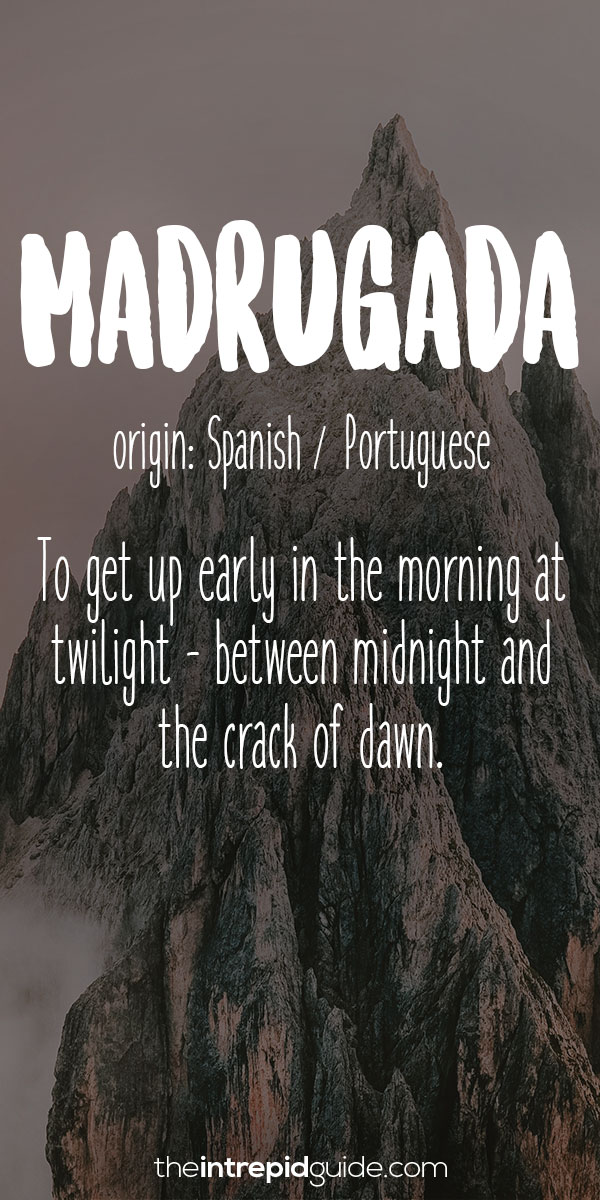
Pena ajena – Ajeno/a generally means ‘someone else’s’ or ‘other people’s’. Literally, meaning ‘sorry for others’, pena ajena is the feeling of humiliation or embarrassment you get upon watching another person’s embarrassment. It’s so embarrassing that it makes you cringe.
Sobremesa – Shared mealtimes are a very important part of Spanish culture, and the time spent after the meal just chatting and relaxing is very important. So important that they even have a word to describe it. Sobremesa literally means ‘over the table,’ is a Spanish expression that describes that wonderful period after the meal is finished but you continue sitting at the table chatting and enjoy each other’s company.
Tuerto – A one-eyed man, blind in one eye .
Tutear – To speak to someone you know well (usually friends and family) informally by addressing using the ‘tú‘ form instead of the more formal ‘usted‘. The term tutoyer is used in French to describe the same thing where the speaker uses the informal second-person pronoun tu rather than the formal vous.
Vacinlando – Vacilando is a beautiful Spanish word which describes the journey or experience of travelling, is more important than reaching the specific destination.
Learn Spanish for travel! Get my free European Spanish travel phrase guide here and my Latin American travel phrase guide here.
Swahili

Swedish
Badkruka – A person who feels somewhat hesitant or doesn’t like to swim in an open body of water due to its low temperature.
Blunda – Blunda is a Swedish word that means to close or cover your eyes to avoid seeing something or facing a hard truth. It’s similar to the English expression ‘turn a blind eye’, or can be the simple act of ignoring something.
Duktig – If a Swede says you’re duktig, that’s a huge compliment, because they are saying you’re skilled, capable, or hard-working. Duktig comes from the Swedish verb duga, which means ‘to be good for / to be acceptable for’. You can use duktig on its own, just as you would say ‘you’re such a hard-worker!’ or ‘good girl/boy!’ to a child. Duktig refers to an action of some sort, whether that’s a job or a specific task.
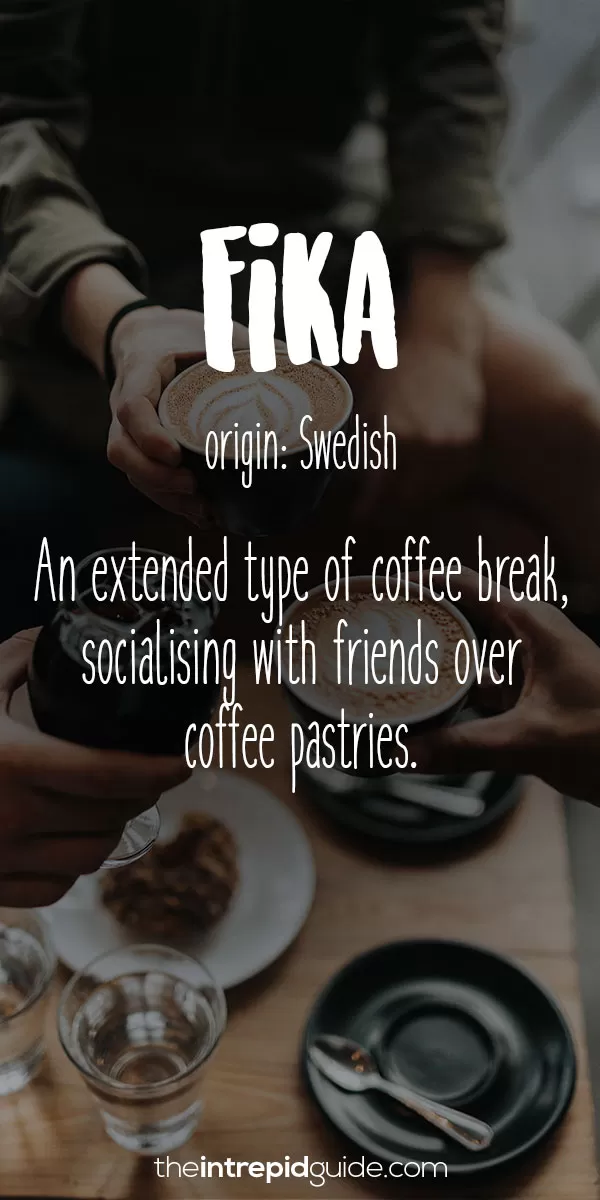
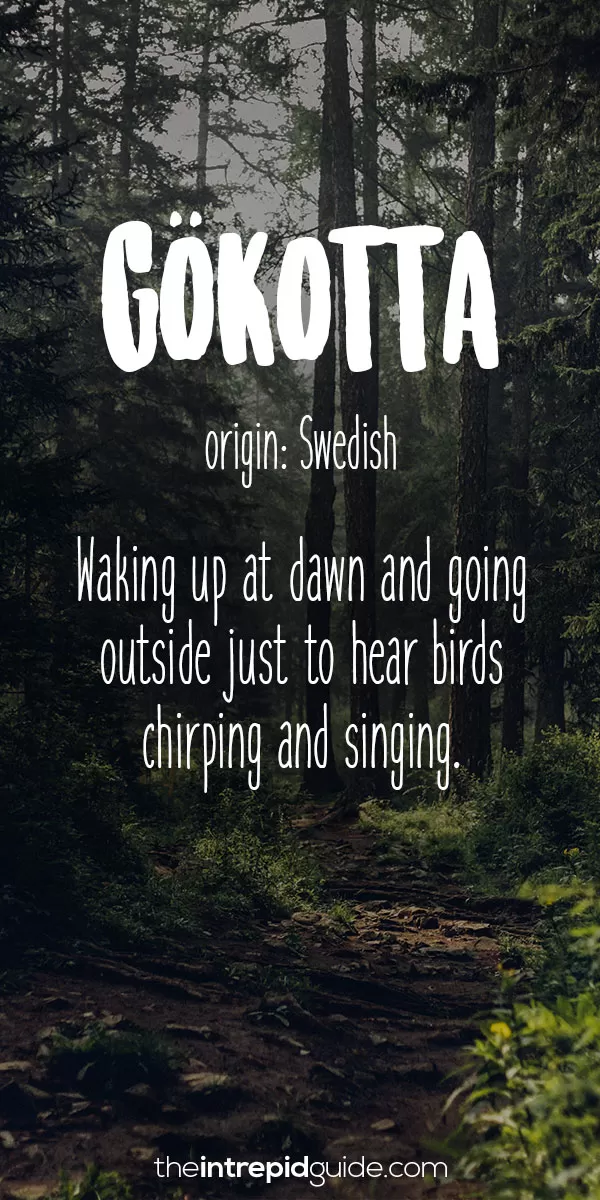
Harkla – Harkla is a fantastic verb that means something very similar to ‘to clear one’s throat’. A perfect example would be the moment before you’re about to give a speech and make a half-cough so you can speak clearly.
Hinna – Hinna is a common Swedish verb that means ‘to be on time’ ‘to find the time’.
Jobbig – Jobbig is an all-encompassing word that means troublesome or trying, annoying or difficult. It can be used to refer to people, things, events – almost anything that is difficult, annoying, or tedious.
Lagom – Lagom means ‘just the right amount’, it’s neither too much, nor too little, but juuuuuust right. Lagom is important in Swedish culture, where you don’t want to ‘stand out’ but having or doing too much.
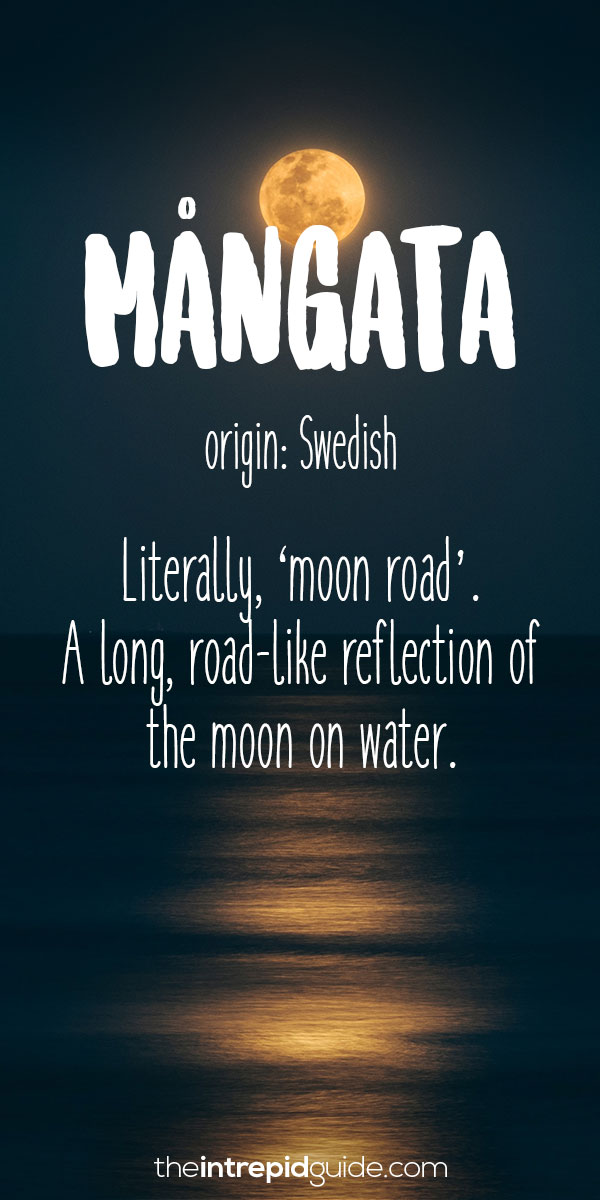
Mormor / farmor / morfar / farfar – We could definitely use these genius Swedish compound words in English to describe each of our grandparents. Mormor, farmor, morfar, farfar literally means mothermother, fathermother, motherfather, fatherfather – respectively. That is, mormor is your mother’s mother, farmor is your father’s mother, morfar is your mother’s father and farfar is your father’s father. So, the question is, do you want to see more of mormor and less of farfar? So see farmor far less? And while we’re at it, barnbarn (literally, ‘childchild’) is the Swedish word for grandchild.
Mysa – Mysa is a Swedish verb for feeling content, cozy and enjoying oneself, especially at home. Not to be confused with the Danish, hygge which relates to any activity or part of your day, mysa refers specifically to being at home.
Orka – This common verb in the Swedish language means ‘to have the energy’.
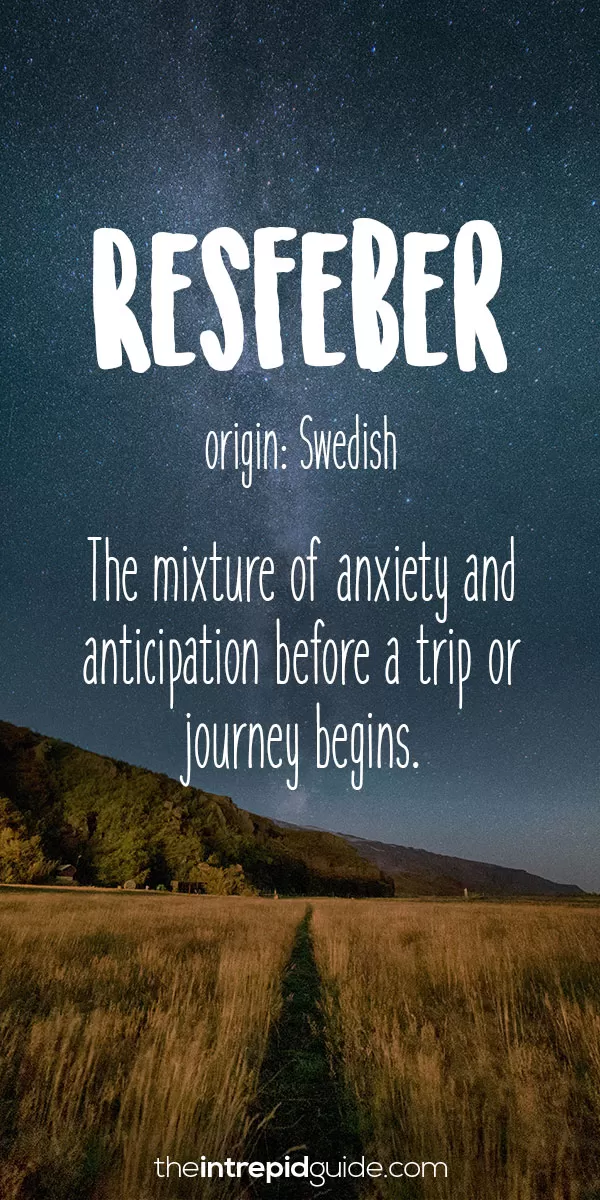
Tidsoptimist – Literally, a ‘time optimist’ this is a person who is constantly late because they think they have more time than they actually do.
Tretår – When two cups of coffee isn’t enough, you go for a second refill or ‘threefill’ of coffee. In Swedish, ‘tår’ means a cup of coffee and ‘patår’ is the refill of said coffee. A ‘tretår’ is therefore a second refill, or a threefill.
Vobba – Describes the very specific act of a parent taking a paid day off to take care of their sick child but still work, for example they check emails or take calls. Vobba is a mash-up of the two verbs att vabba (to take care of a child) and att jobba (to work).
Vabba – From vobba, comes vabba, a shortened version of vård av barn, which means ‘to be at home with the kids’.
Learn Swedish for travel! Get my free Swedish travel phrase guide here
Tagalog
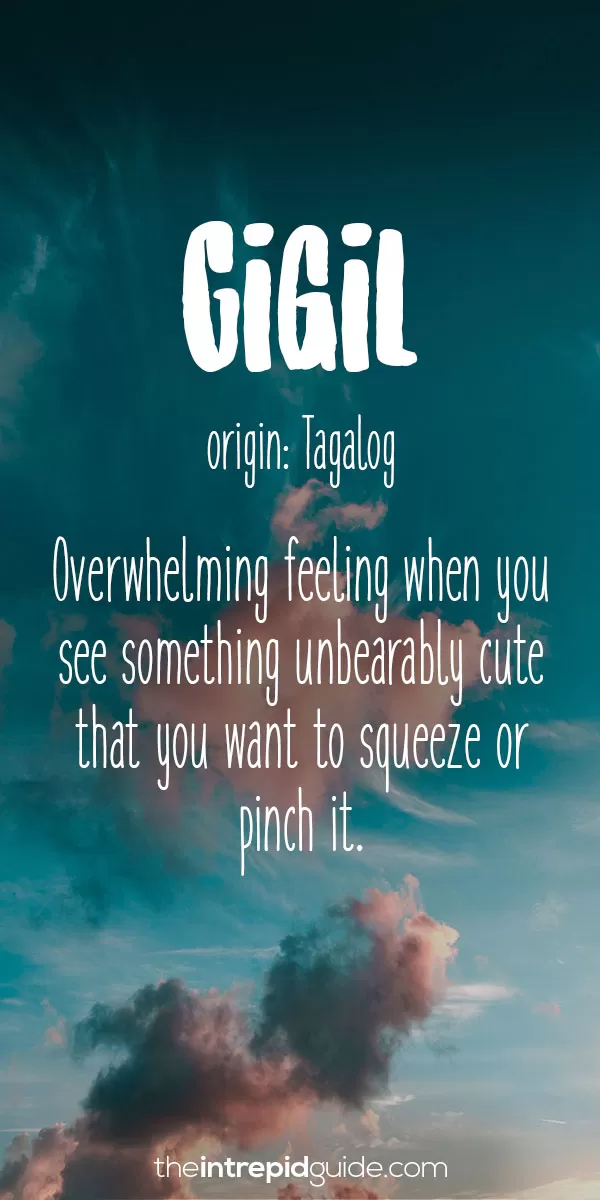
Tampó – In Filipino culture, tampó is when a person withdraws his or her affection or cheerfulness towards someone who has hurt them. A mild case of ‘to hold a grudge’ where you’re someone between hurt and disappointed. It usually occurs between people related to each other. For example, when a husband forgets to bring his wife flowers for their anniversary, she can have ‘tampó‘ against him.
Kilig – Kilig can be roughly translated as ‘romantic excitement’, it describes the happiness and giddiness you feel when something romantic takes place, either to you or someone else. It’s the feeling of butterflies in your stomach when you catch your crushes’ eye for the first time, witnessing a marriage proposal, or watching your favourite TV show couple.
Tamil
Oodal – An exaggerated, fake anger that usually follows a quarrel between lovers.
Tshiluba (Congo)
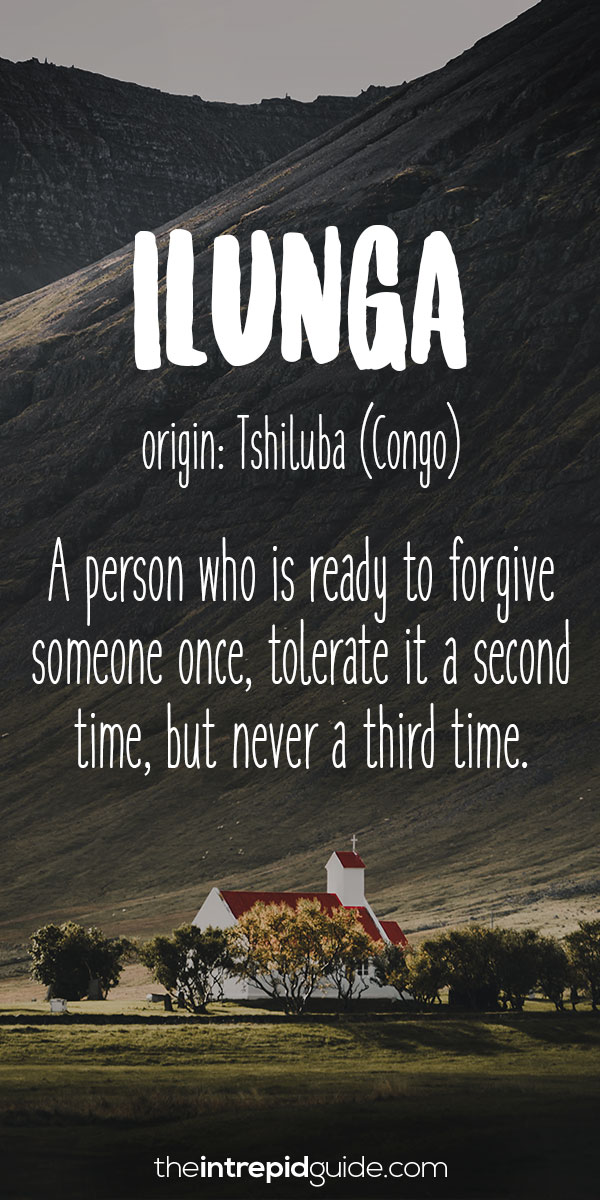
Tulu (Indian)
Karelu – The mark left on the skin from wearing something tight, such as jeans, socks, or a bra.
Turkish

Urdu
Goya – This Urdu word refers to a feeling of wonder and disbelief that accompanies a particularly realistic fantasy. The suspension of disbelief makes it seem so real that it temporarily becomes reality. This is usually associated with good storytelling.
Wagiman
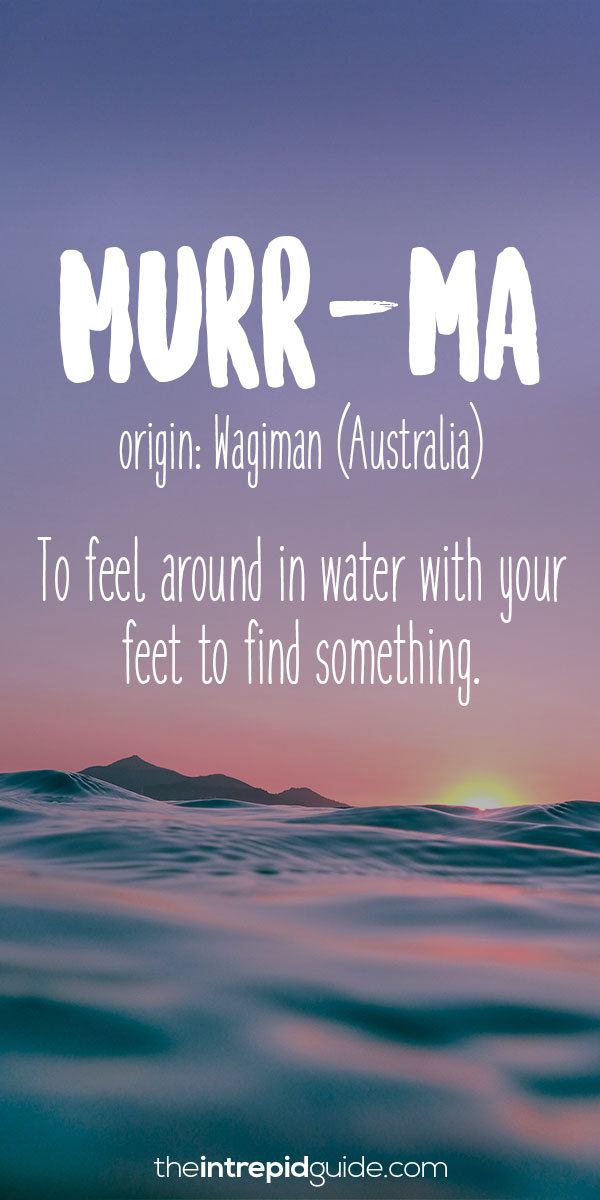
Welsh
Glas wen – The literal translation is ‘blue smile’, and is used to describe a mocking sarcastic smile.
Hiraeth – Pronounced [here-eyeth] (roll the ‘r’), this beautiful Welsh word is much like the Portuguese saudade mentioned earlier or the Romanian dor, it conveys a feeling of homesickness, sense of regret, along with a general sadness over the lost or departed. This is a longing for one’s homeland, or even a romanticized past, with a yearning for it to come back.
Yaghan
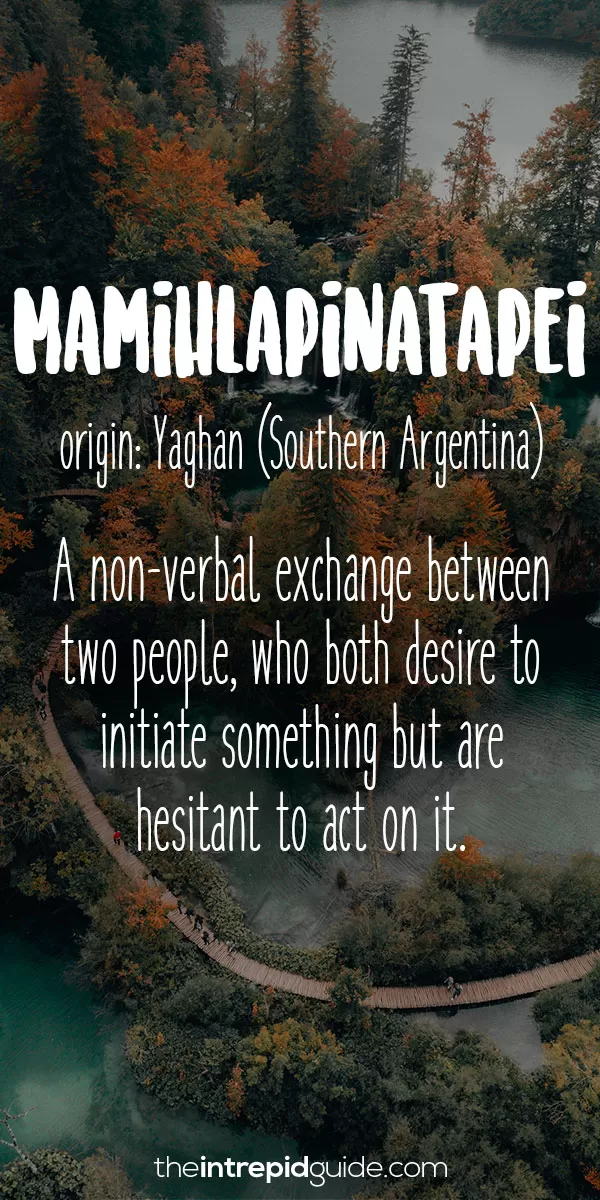
Yiddish
Shlimazl (שלימזל) – A chronically unlucky, usually inept, clumsy person.
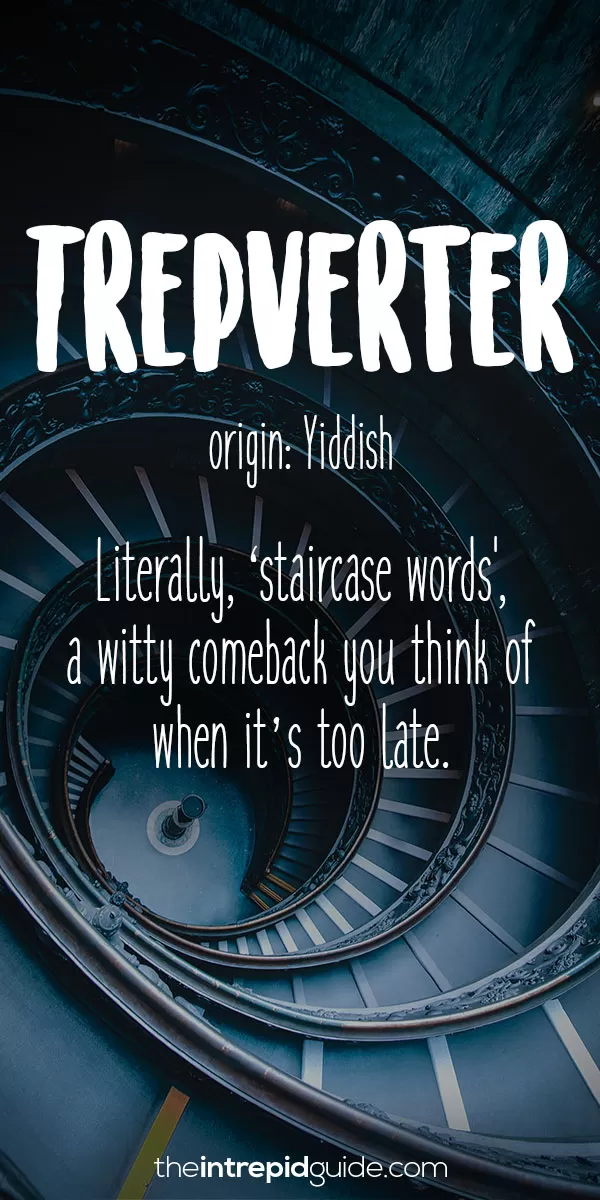
Luftmensch (לופֿטמענטש) – Luftmensch is used to refer a person with their head in the clouds. They are more concerned with airy intellectual pursuits than practical matters like earning an income. From the Yiddish לופֿט (luft, ‘air’) and מענטש (mentsh, ‘man’).
Farpotshket – Pronounced [fahr-POTS-SKEHT], farpotshket is when you or someone you trust tries to fix something but only ends up making things worse, causing irreparable damage. All you can do is shrug, knowing that you should’ve known better. Farpotshket also has an associated verb – potshky (POTs-ski), which means ‘to fiddle with something in a well-meaning and purposeful way, but with a complete lack of competence.’
Chutzpah – Is an untranslatable Yiddish word for adopting a ‘don’t-take-no-for-an-answer’ attitude where you’ll build up the guts to do something ballsy.
Zulu
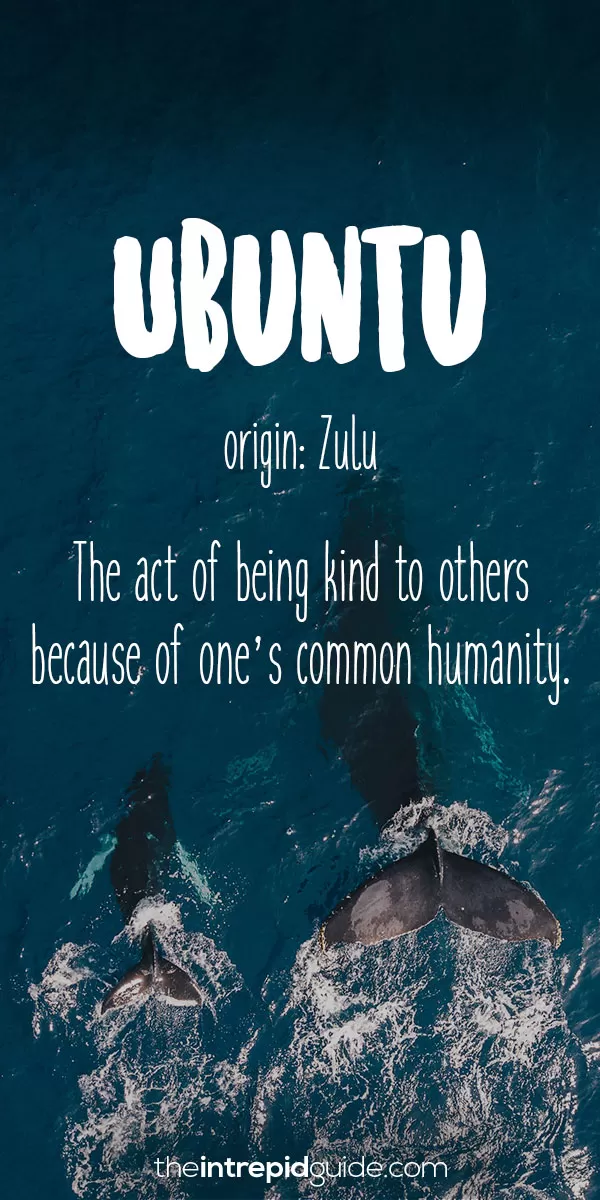
Over to you!
Which one of these words in your favourite? Was it the Malay, pisan zapra – the time it takes to eat a banana or the Portuguese cafuné – the act of tenderly running your fingers through someone’s hair. Share your favourites in the comments.
Can you think of any other ‘untranslatable’ words? Have you ever come across words and phrases that could not be translated into your native language? Let me know in the comments and I’ll add them to the list!
Want to know more about learning languages? Start here!
- 22 Top Language Learning Resources You Should Use
- How to Say ‘I Love You’ in 128 Different Languages [Ultimate A-Z Guide]
- How to Learn Languages Like Crazy, Even If You Have a Crazy Life [3-Step Method]
- 10 Proven Memory Hacks: How to Remember New Vocabulary Faster
- How long does it REALLY take to learn a language? [A Practical Guide]
- 18 Unexpected Advantages & Health Benefits of Learning A Foreign Language
- 23 Cool Gift for Language Learners They Will Actually Use and Love
- Memrise vs Duolingo: Which Language App is Best For You?
- Mondly Review: 10 Ways Mondly Drastically Improved My Language Learning
- 6 Language Learning Tips: How to Learn a Language from Home
- What Type of Language Learner Are You? Your 4-Step Personalised Learning Plan
- 44 Best Movies on Disney Plus for Learning Languages
- 13 Ways to Seamlessly Integrate Language Learning into Your Daily Life
- 10 Pro Tips: How to Learn a Language with a Full-Time Job
- 7 Reasons Why You Should Go on a Language Holiday
- Essential Travel Phrases: How to be Travel Fluent in 10 Simple Steps
- How to Learn Your First Foreign Language in 8 Simple Steps: A Beginner’s Guide
- 11 Life-Changing Reasons Why You Should Learn a Language
- 42 beautiful Inspirational Quotes for Language Learners
- Language learning tips: 11 Polyglots Reveal The Secrets of Their Success
- Top 10 Best Ways to Learn a Language Better and Faster
- How Many Languages are there in the World?
- 78 FREE Dictionaries to Learn a Language Fast [Free eBook Download]
- 22 KEY Travel Phrases That Will Transform Your Travels [Free Guide]

